#i just think that while the movie definitely had issues. a central part was the acceptance and celebration of the average woman
Text
girl dinner bimbo divine feminine barbie tradwife day in the life girl math contour 3 kids at 22 passenger princess. what if i shot my phone
#my roommate was talking about how this girl on campus looked exactly like a barbie dressed in full pink full glam flawless blonde hair#and smth about it feels unsettling idk. like the barbie movie was rly surface level feminism but i feel like we're all missing the part#about how it's okay to not actually look perfect like a barbie doll constantly bc that's a ridiculous standard#makes me think of the scene with the old woman at the bus stop and barbie calling her beautiful#i just think that while the movie definitely had issues. a central part was the acceptance and celebration of the average woman
3 notes
·
View notes
Text
TOP 10 TV SHOWS I WATCHED IN 2023
1. GREASE: RISE OF THE PINK LADIES
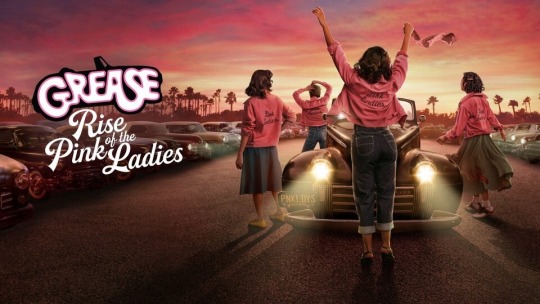
this prequel to grease tells the story of how the “pink ladies” gang was created. it follows new original characters, although the younger versions of some movie characters are also shown/mentioned. it is a beautiful musical about feminism, love, friendship, racial relationships and queerness in the 50s. the songs stuck in my head & my heart. and it quickly became one of my favorite shows ever. incredibly devastating that it only got one season, because it was very unique and important.
2. FREERIDGE
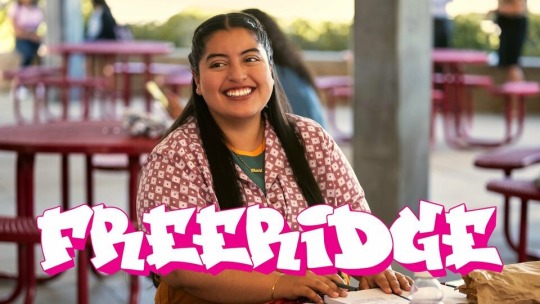
on my block’s spin-off. it’s just as unhinged, dripped in magic and ridiculousness. less violent than its predecessor, it follows a group of four friends who come into possession of a “cursed” box, and as they try to get rid of it, shenanigans ensue. you’ll see a few familiar faces from omb and fall in love with the new ones. experience this block’s craziness again or for the first time. be gnomes ahead.
3. EVERYTHING NOW

tells the story of mia as she returns from rehab for ed, and tries to catch up on her teenage experiences. secret hookups, betrayals, love triangles, lying and pretty people. similar in tone to heartbreak high & genera+ion.
4. VAMPIRE ACADEMY
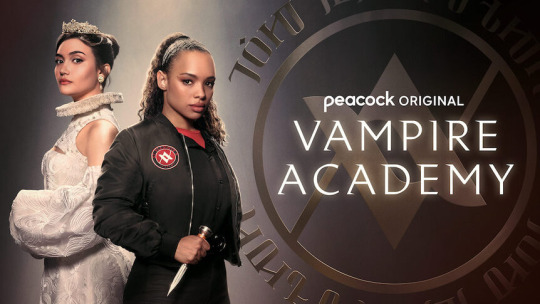
it’s about a royal vampire and her half-vampire protector, as they navigate their duties after a tragic event changes their lives.
rose and demitri’s love story certainly carries the show. the cast is great and it’s a fun watch. definitely a step up from the movie.
5. SHRINKING
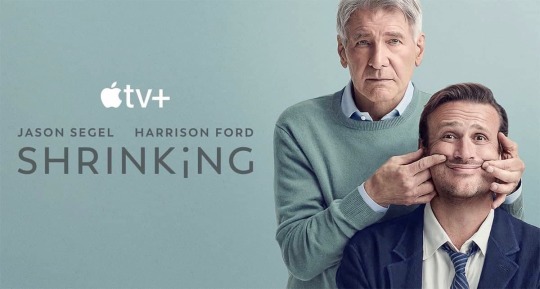
jason segel plays a therapist who starts telling his patients what he really thinks, while trying to maintain a relationship with his daughter (lukita maxwell) and estranged friends.
it just felt very fun and warm to watch.
6. CITY ON FIRE
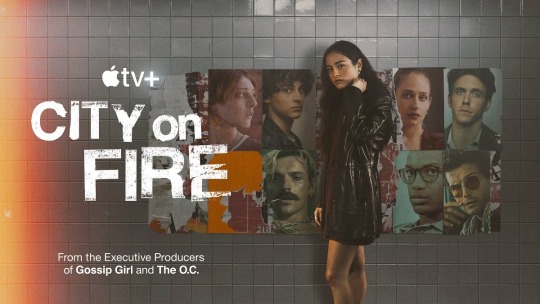
a girl is shot in the central park. and it intertwines lives of a boy who’s in love with her, a rock band and a rich powerful family. in trying to figure out what happened to sam, charlie realizes the girl of his dreams had more secrets than he suspected.
the cast is perfect and billy is the best character, that’s all i have to say. this show’s exciting, dramatic, in parts reminded me of gossip girl, succession, 13rw and grand army.
7. HIGH SCHOOL
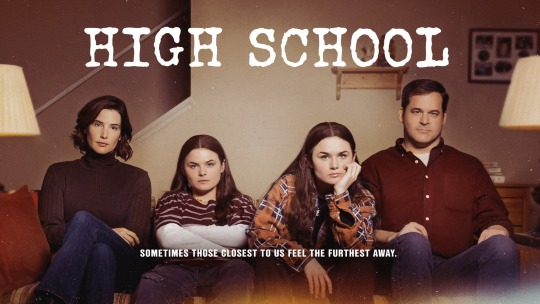
twin sisters in the 90s grow closer as they learn how to write music. they experience first love, make new friends and deal with family issues.
the true story of how tegan&sara became the musical duo that they are.
8. HARLAN COBEN’S SHELTER
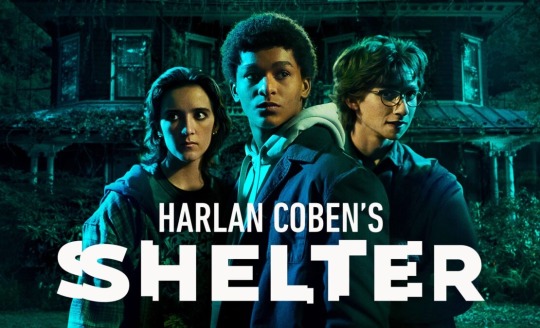
after a traumatic accident mickey moves to his dad’s childhood home, where he uncovers mysteries connected to his parents’ work.
reminded me of teen wolf, because the storyline is dark but the friendship and humor of the main characters shine through.
9. YEAR OF
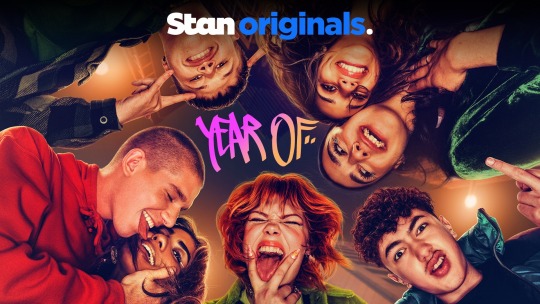
a group of classmates try to overcome the loss of their friend. heartbreak high made me interested in aussie shows. and this had similar energy.
10. QUEEN CHARLOTTE
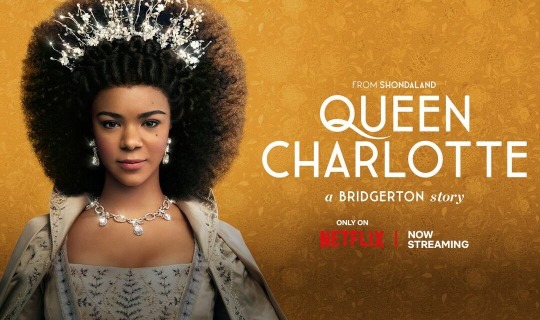
a fictional story of a young queen’s marriage to the king of england. bridgerton’s spin off which imo was better made than the original show.
#top favorite#what to watch#shows to watch#2023 top 10#queen charlotte#city on fire#harlan coben's shelter#everything now#vampire academy#grease rise of the pink ladies#freeridge#shrinking#tegan and sara#year of
19 notes
·
View notes
Text
Inequality For All
youtube
The issue of poverty and economic justice has always been part of the Church's social concern. Not only is this with regards to the publication of Rerum Novarum and the birth of Catholic social teaching when Pope Leo XIII shared the Church's concern regarding the plight of workers and the rights they should have. This social concern goes right to the time of Jesus who saw it as his responsibility to heal and feed those who were poor and marginalized.
The YouTube movie by Robert Reich, "Inequality For All," goes into the economic history of the United States reviewing the policies that allowed us to grow the middle class in America from 1947 to 1979. It then looks into the shift and pro-corporate and anti-poverty policies that had the opposite affect, what the graph below calls "the Great Regression."
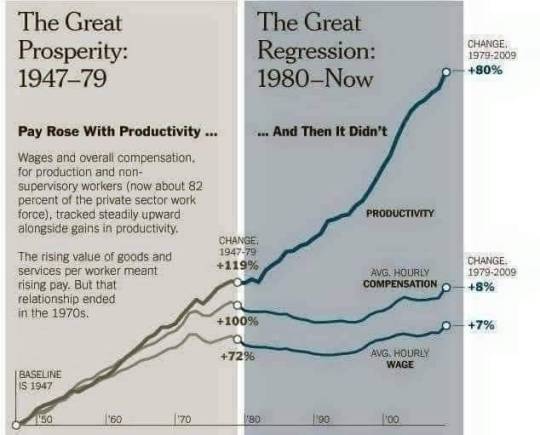
There are a number of posts that I have developed that goes into this issue, both from the Catholic concern and from the standpoint of economic policies. These include:
Why Inequality Persist in America (with links to past posts)
USCCB on Income Inequality
The Global Solidarity Fund, a Christian Economic Model
The simple point that has to made (over and over again it seems) is that the social programs we had after World War II, the economic model that was based on a Keynsian capitalist system (which people will now erroneously call socialism/communism), is when we experience a booming economiy that helped develop the middle class.
Just to clarify a definition: The keynsian capitalist system generally advocated for a regulated market economy. The proposed regulations focused on the corruptive activity of the private sector and it allows the government to have an active role as it intervenes during recessions and depressions. Recognizing that an unregulated market economy can, and has become, volatile and unstable this can be mitigated by economic policy responses coordinated between government and central bank. In particular, fiscal policy actions taken by the government and monetary policy actions taken by the central bank, can help stabilize economic output, inflation, and unemployment over the business cycle.
Pope Francis has expressed the concern about this as a global economic phenomenon which is why he has been promoting the Economia De Francesco Model to reveiw this push to deregulate the global economy and to widen the gap between the wealth minority (the 1%) and the rest of us.
While the income of a minority is increasing exponentially, that of the majority is crumbling. This imbalance results from ideologies which uphold the absolute autonomy of markets and financial speculation, and thus deny the right of control to States, which are charged with providing for the common good. A new, invisible and at times virtual, tyranny is established, one which unilaterally and irremediably imposes its own laws and rules.
The Preferential Option for the Poor is the Catholic principle that always places economic injustice in check. Bishop Barron offers a good articulation of this principle in this other post.

The movie link is below but I think you have to open this on a seperate window. The movie was made ten years ago but the research is still very relevant as it defends the need to promote the socio-economic policies we desperately need to promote a middle class economy.
youtube
If the link does not work place this on a webpage: https://youtu.be/zvAFPHLFMa0?si=CtXlItq45bfsEkUb
0 notes
Text
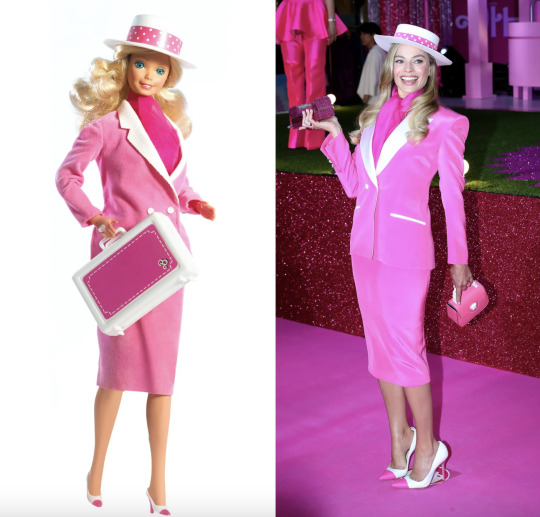
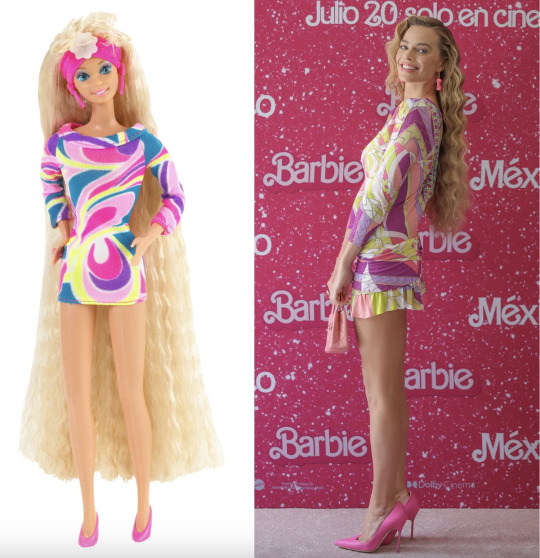
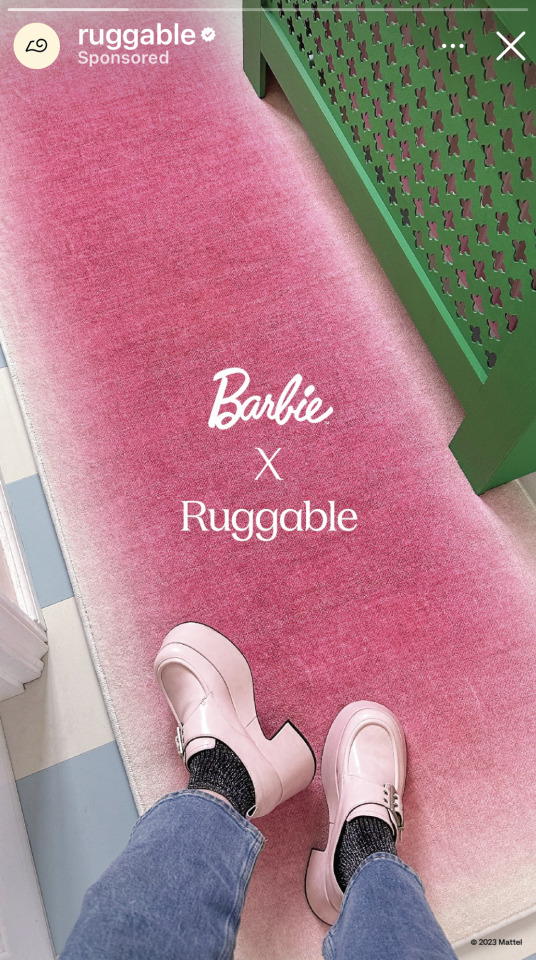
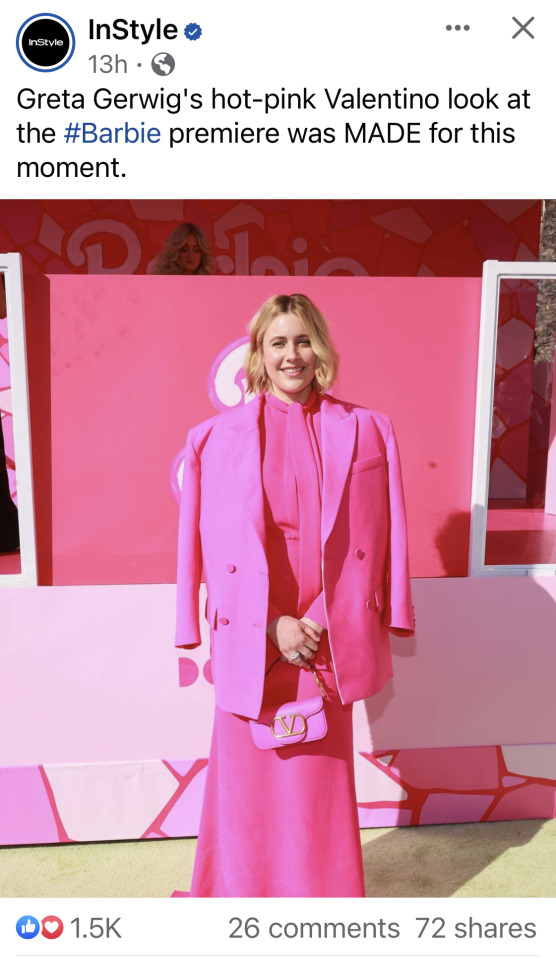
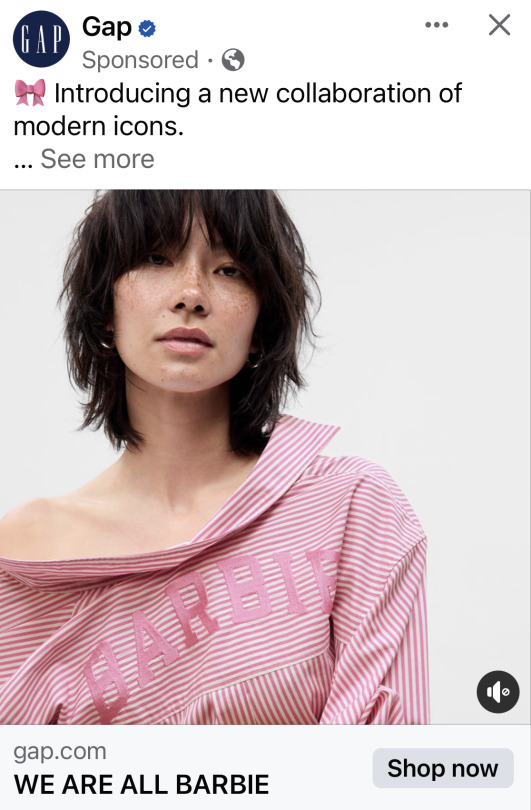
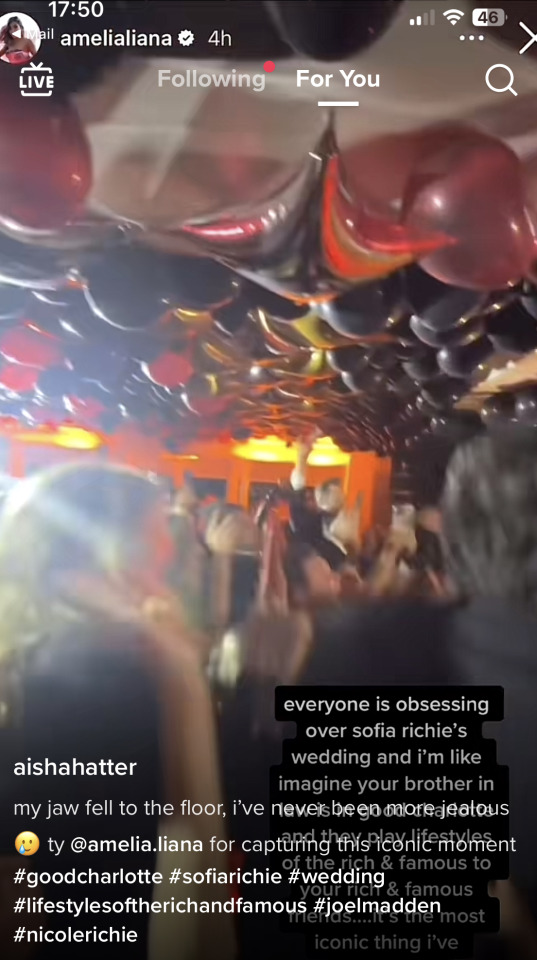
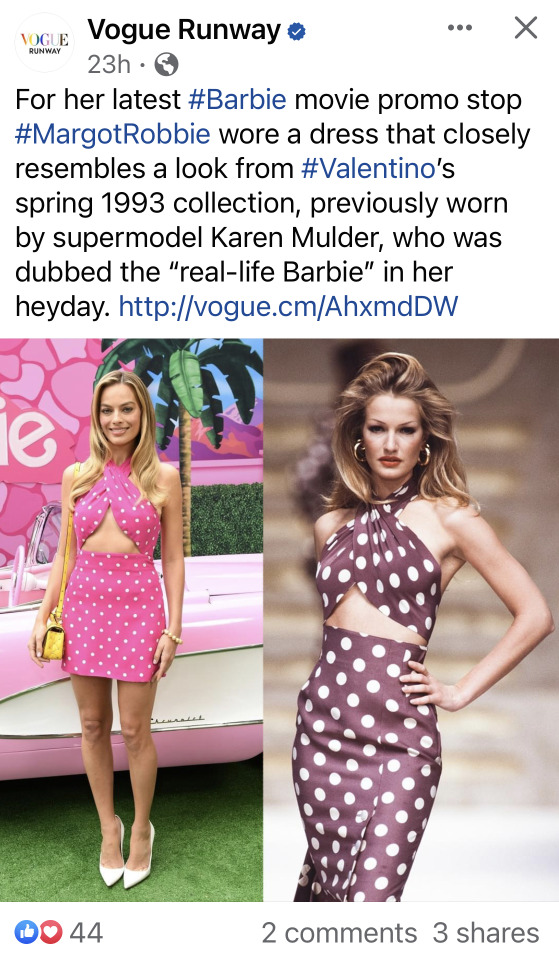
Is there a difference between an icon and a trademark? What the Summer 2023 Barbie fashion party might tell us…
Well, summer is almost over, and, unless you’ve been on Mars (scratch that- you probably could have seen the sea of pink from space!), you’ve had or you've at least been living in the greater context of a Barbie-filled summer. You might have mixed feelings about this. As Vanessa Friedman put it, you might be “all pinked out” and never want to see another piece of Barbie-merch in your life. On the other hand, you might be like the countless other people celebrating the Barbie movie’s empowering message(s), its musical number for Ken, or just reveling in the fact that a film helmed by a woman director made over 1 billion at the box office. Whichever camp you fall into, there is one aspect of our Barbie-filled summer which has made all this celebrating, critique, and dress-up possible: intellectual property and, we might even say, its limits.
A central part of Margot Robbie’s promotion of the Barbie film has centered on how lucrative and full of potential the Barbie-world IP was/is; on how Robbie knew this while negotiating with Mattel and during the production of the film. As VOGUE reported in its Summer 2023 issue, Robbie observed, “The word [Barbie] itself is more globally recognized than practically everything else other than Coca-Cola.” (p. 82). And this emphasis on leveraging global recognition through Barbie’s IP fit Mattel’s own conception of itself as a company. As Ynon Kreiz, Mattel’s CEO, told The New York Times Magazine, “We used to think of ourselves and present ourselves as a manufacturing company…The specialty was: We make items. Now we are an I.P. company that is managing franchises.” (p. 26) But there is something important buttressing Kreiz’s characterization of Mattel as a company focused not on tangible products or items for sale but on the IP that makes those products/items possible: the cultural meaning of Barbie. Central in management’s mind is “[t]hat Barbie is not a toy; she is a pop-culture icon. That she does not have customers; she has fans. If you take that seriously, it outlines how to proceed. An icon who wants to stay at the center of the culture can’t keep putting out the same old thing and suing anyone who riffs on it. She has to stay current.”
And this points to a tension- and a question- that has implicitly animated and informed each one of our reactions, interpretations, and emulation of Barbie this summer. What is the difference between an icon and perhaps the strongest part of Mattel’s Barbie IP arsenal, a trademark? Does managing a cultural icon automatically mean a strong trademark on the market, or does having a cultural icon in your arsenal require ceding some proverbial trademark ground to your consumers or even to the public at large?
An icon is defined in a myriad of ways: it can be “a person or thing widely admired especially for having great influence or significance in a particular sphere”; an “emblem or symbol”, a sign, pictorial representation or image; or “a representation of sacred events or especially of a sacred individual (such as Jesus Christ, the Virgin Mary, or a saint) used as an object of veneration or a tool for instruction.” (For this last definition, I wouldn’t go so far as to compare Barbie to a saint, but the characterization of Barbie as a sacred individual is apt- haven’t we been venerating her since our childhoods? There may also be more to say about the woman/Virgin Mary/Barbie female triangle, but I digress…) The definition of “iconic” the adjective places even more emphasis on influence and significance and symbolism. Iconic is defined as “very famous or popular, especially being considered to represent particular opinions or a particular time”; “showing a relationship between the form of a sign, such as a word or a symbol, and its meaning”; and “of, relating to, or having the characteristics of an icon.” Complicating our common understanding of icon and iconic, however, is its ubiquitous use in, to name just a few,
the titles of creative works (looking forward to binge-watching what VOGUE deems “four iconic supers” in the Apple TV miniseries “The Supermodels” as I currently lose myself in PBS’ “Iconic America”)
marketing campaigns (I’m looking at you Fendi and the “iconic shape” of the Baguette not to mention less luxury fair like JCrew’s “iconic Edie bag”)
and on TikTok (Sophia Richie Grainge dancing to “Lifestyles of the Rich & Famous” sung by her brother-in-law was “iconic”), which we might even count as everyday conversation….
In some ways the definition of a trademark chooses a slice of the definition of an icon/iconic, protecting or extending a legal right to police the relationship between a sign and its meaning, which may include influence and fame. We might say that a trademark right effectively extends a legal right to the owner of a trademark to police the relationship between a word, name, symbol, or design and a specific message that it conveys to consumers- who produces the goods to which the mark is applied. And ideally this should not extend to who produces the ideas within the goods. As the holding in the Dastar case outlined “origin” in the phrase “origin of the goods” should not extend to “the person or entity that originated the ideas or communications that ‘goods’ embody or contain” but rather to “the producer of the tangible product sold in the marketplace” including “the actual producer, but also the trademark owner who commissioned or assumed responsibility for (“stood behind”) production of the physical product.” (p. 31- 32) Of course, trademark law also encompasses a number of other meanings and messages beyond who the producer of goods is, including who has sponsored or who is affiliated with the product. And with a claim like trademark dilution that goes beyond the concept of consumer confusion, trademark law (or, we might say trademark owner(s)) are arguably trying to claim a larger piece of the pie of meanings, messages, and symbolisms that exist between culture and commerce in their marks. And this should come as no surprise given the increasing role that managers of brands see themselves playing in culture. And as fashion, culture, and heritage continue to cross-pollinate (see the latest teasers and campaign for Fall/Winter 2023 Ferragamo fashion which showcase images of cultural properties and artwork in the Uffizi), we might more seriously consider reading fashion brands’ cease-and-desist letters and actions to police their trademarks in a wider cultural lens.
Do brands have a responsibility to police their marks while allowing for remixing, uses beyond those that are fair under the law, and even, perhaps, creations that may be trademark uses but communicate messages with which the brand would disagree (I'm looking at you Hermès)? And, to challenge Justice Scalia’s assumption, do consumers “who bu[y] a branded product… [at times]...assume that the brand-name company is the same entity that came up with the idea for the product, or designed the product”, especially if there is a marketing campaign that equates the producer or designer with the creation and dissemination of ideas embedded in the product? (p. 32) And might we, as consumers, care about who came up with the idea for a product as part of the meanings we identify with a trademark? The fact that we in fact do care might be the very reason we are so obsessed with authenticity on the fashion market in the first place.
The question of whether icon=trademark, or how these two terms overlap in a Venn diagram like space, is rife for more research and analysis (and is the topic of an academic paper I am currently finishing- full disclosure!). And there are some indications that “iconic” is doing potentially heavy lifting to convince judges and examiners that a brand has a strong mark, that a design has obtained secondary meaning, or is famous. In the VIP v. Jack Daniels opinion, iconic was used to describe the Jack Daniels mark at issue (“VIP sells products mimicking Jack Daniel's iconic marks and trade dress that mislead consumers….”) and Jack Daniels was described as only one of many “iconic brands” founded in the 19th century, among them Campbell’s Soup (pre-Warhol!), Quaker Oats, and Coca-Cola. (p. 3, 9-10). An early empirical observation that iconic is being imported into the application of trademark’s likelihood of confusion test and even into dilution actions raises questions about what legal weight we should give “iconic”, as a normative question (if we give it any weight at all). But there are some takeaways we might already observe about similarities and differences between icons and trademarks from our collective Summer 2023 Barbie fashion party. And central to those takeaways is the fact that we do seem to care about the ideas contained within the Barbie marks, whether registered or not. (For a deeper dive into Barbie's registered trademarks, and Barbie Pink as not yet registered in the United States see Rachael Dickson's great and informative videos and tweets).
First, “iconic” has been part of the Barbie marketing campaign, especially during Margot Robbie’s red carpet re-interpretations of Barbie’s celebrated looks and fashion magazine’s editorials commenting on these re-interpretations (we might even call them copies). As Glamour put it “There’s no way we will ever forget how iconic all of Margot Robbie’s Barbie looks have been…” Side by side comparisons between Robbie’s iconic looks and the “iconic Barbie dolls that inspired them” beg the question of what meaning iconic has here. Are Robbie’s outfits iconic because they point back to the iconic Barbie outfit, thereby making consumers think of Mattel even though Mattel did not make the outfit Robbie is wearing? While some of Robbie’s outfits approximate Barbie’s outfits very closely (see Day to Night Barbie, 1985 compared to Robbie in a Versace Day to Night replica) others repeat a pink and gingham pattern in more freely inspired looks designed by Prada and Chanel, among others (I’m thinking of you two, Quick Curl Barbie, 1973 and Barbie Movie Barbie, 2023). What exactly is the symbol here within the fashion that is “iconic” of Barbie? If it is the entire outfit or design, iconic-icity might run up against the doctrine of functionality in trademark law if we were to contemplate whether the outfit/design could function as a trademark. If it is a combination of colors or the pink and gingham pattern, how do we conceive of secondary meaning in this case, especially when fashion brands known for using those colors or the color pattern in question have helped to create the outfit beyond the category of toys and in clothing? And Robbie’s outfits naturally bring Barbie’s outfits into 2023, with all the contemporary style and timeliness that implies (crimped hair aside, in this Pucci look, the headband was a no go). If a contemporary fashion outfit worn by Robbie is iconic of Barbie and indicates Mattel as its origin, what is the icon and what type of origin are we talking about? Is the icon/sign the idea of Barbie and the origin the cultural meanings we have caught up in the particular Barbies Robbie is citing? Or, is the icon/sign to which Robbie’s outfit is referring the particular Barbie doll product in its tangible form and the origin Mattel as a producer? With what would consumers say they most associate these contemporary fashion outfits? Is the answer Barbie the doll, Barbie the idea, or even, perhaps, Barbie the movie?
Complicating the question of what is the icon in Robbie’s replications of Barbie’s outfits are the added IP layers that the fashion brand collaborators bring to the table. Mattel’s multiple collaborations with fashion brands have blurred the lines between brand icons and Barbie icons. A whole fashion editorial team at VOGUE seems dedicated to spotting how fashion and luxury brands have referenced their own archives while catering to the Barbie universe (consider Valentino’s 1993 polka dots). Collaborations with still other, more commercial fashion brands and companies- a Barbie rug!- might seem to make Mattel’s trademarks more or just as recognizable as those of the fashion brand or other company with which it is partnering. Consider the Gap x Barbie collab described by Gap as “a new collaboration of modern icons.” Here, the word Barbie and Gap are prominent, and the color pink (whether in the Barbie Pink Pantone color or not) may only help to make these products particularly Barbie association prone. At the same time, however, collabs with brands that have historically used similar colors to Barbie Pink or that are now known on the market for their presence on a pink or Barbiecore aesthetic spectrum risk subsuming consumers’ identification of Mattel as the source of these products. Instyle may have said that “Greta Gerwig’s hot pink Valentino look at the Barbie premiere was MADE for this moment” but which comes first in consumers’ minds when they see Gerwig in this outfit at the Barbie premiere- Valentino the brand, Mattel the producer of Barbie, the idea of and the creative product generated by Barbie, or even more general emotional feelings linked to pink?
Of course, informing the question of what exactly is the relationship between icon and trademark in the context of the cultural and commercial Barbie universe is the fact that the more we dress up as Barbie, think pink, and embrace Barbiecore, the more cultural power we give to Barbie and to its producer Mattel. The more we have the freedom to dress in Barbie Pink to attend the Barbie movie (whether or not we buy and wear a dress or accessory created through a licensing deal with Mattel) the more iconic – very famous or popular – Barbie may become in our minds. We might think Barbie when we see any shade of pink, any pink polka dots, any pink and white gingham. But thinking Barbie does not necessarily mean thinking Mattel, and this is where Kreiz’s plan to manage Barbie as a pop-culture icon and not a toy comes full circle for the company's, but not necessarily the public’s, benefit. Expanding its presence from products on the market to ideas contained in films and music progressively expands Mattel’s IP portfolio and its presence in the minds of consumers whether the product they are selling benefits from IP rights or not. Even if the validity of a trademark right in a Barbie doll fashion design or Barbie Pink is questionable, it might not matter so much if everyone if wearing Barbie colors, watching Barbie the movie, and talking about the cultural meanings and gender roles contained in the idea of Barbie herself and the movie about her. In other words, icons might mean strong trademark rights on the market in certain circumstances, but having an icon and managing it “at the center of the culture” might lessen concerns about managing third party uses of marks in commerce at a more general level. And in this sense, culture might trump commerce or, at the very least, commercial might become cultural, and vice versa.
Further Reading
Kate Spade LLC v. Wolv, Inc., Opposition No. 91241442, TTAB, April 25, 2022
In re Max Mara Fashion Group S.r.l., Application Serial No. 87786944, TTAB, February 12, 2020
Nike, Inc. v. Honest E Online LLC, Opposition No. 91254139, TTAB, April 20, 2021
Cartier International A.G. v. Lance Coachman, Opposition No. 91209815, TTAB
Chanel, Inc. v. Camacho & Camacho, LLP, Opposition No. 91229126, TTAB, January 12, 2018
Marc Fisher LLC v. Bottega Veneta, Opposition No. 9121425314
In re Bottega Veneta International S.a.r.l., Serial No. 77219184, TTAB, September 30, 2013
TESS, Registration Number 4527371, Registration Date May 13, 2014
The Coca-Cola Company v. Robert Troy Hoff, Opposition No. 91244286, TTAB, May 14, 2021
“Hello Barbie” in VOGUE Summer 2023
Willa Paskin, “Plastic Fantastic” in The New York Times Magazine, July 16, 2023
Dastar Corp. v. Twentieth Century Fox Film Corp. et al., 539 U. S. 23, 31 (2003)
https://www.latimes.com/opinion/story/2023-08-04/beyond-being-feminist-barbie-preaches-more-kenpathy
https://ruggable.com/collections/barbie-rugs-and-doormats?gclid=CjwKCAjw5_GmBhBIEiwA5QSMxCjYs2t9St9CvS8bYIWzBF8SPGbcONfjR_4rrZ-Aodu1FvyyG8gqmhoCJoMQAvD_BwE
Jeanne Fromer, "Against Secondary Meaning", 98 Notre Dame L. Rev. 211 (2022), https://scholarship.law.nd.edu/ndlr/vol98/iss1/4/#:~:text=The%20dangers%20of%20enshrining%20secondary,meaning%20creates%20which%20hurt%20smaller
Graeme Dinwoodie, "Trademark Law as a Normative Project" (forthcoming in the Singapore Journal of Legal Studies)
instagram
Images
From references above and screen shots from Facebook, Instagram, and TikTok
#barbiecore#barbie#trademark law#color#barbie pink#margot robbie#barbie the movie#pink#iconic#iconic copies#likelihood of confusion#trademark dilution#valentino#prada#VOGUE#sophie richie grainge#greta gerwig#culture#creativity#fashion law#luxury law#chanel#IP law#films#creative products#creative industries#Instagram
1 note
·
View note
Text
Avatar: The Way of Water (2022, dir. James Cameron) - review by Rookie-Critic

Avatar: The Way of Water is only marginally better than the original. It clocks in at 3 hours and 12 minutes, and unfortunately it does feel its length a little bit. There are sequences that could have been cut shorter, shots linger a little too long (which is kind of understandable. Most of the draw of this film, much like the first one, is the visuals), and the tone of the film tends to feel slightly inconsistent from scene to scene. It's not the most egregious problem a movie could have, but when it makes the runtime that long, maybe it's time to kill your darlings a little bit. None of this affected my enjoyment of the film too much, though, and I have two other bigger problems that I found were more detrimental to my overall experience. The first, and biggest, of the two is that they brought back Stephen Lang's Colonel Quaritch (I'm not considering this a spoiler because his name is all over promotional material and he shows up about 10-15 minutes into the film). I found him to be one of the most uninteresting parts of the first Avatar, and was very interested to see what direction Way of Water would go as far as a central villain is concerned. In the film's defense, his character does manage to be more interesting in this one, but I think they could have applied those beats to a completely new character and it would have been better and felt a little less like the sequel trying to capitalize on nostalgia for the first one (a quality that, might I add, I don't feel like Way of Water has outside of this). My second big issue, which I found less bad and more just distracting, is that the character of Kiri, the Sullys' adopted daughter who is 14-years-old in the film, is being voiced by Sigourney Weaver, who is most definitely not 14. For the most part Weaver gives a great performance, I'm not questioning her acting ability at all, she's Sigourney Weaver, but try as she might she is unable to sound like a child and it is incredibly distracting. There are story-driven reasons for why Weaver is voicing this character, but I still think the filmmakers would have been better suited just casting a younger actress to play Kiri.
I've spent a fair amount of text on the stuff I didn't like about this film, but in all actuality I did really enjoy it. The younger Sullys are just as important as their parents, if not more so, and it's a very welcome change from the first one. The longer runtime does allow you to get to know all 5 children fully, and they each get their moment to shine on screen. Kiri and Lo'ak, the family's second son, specifically feel like the film's main protagonists, and while superfans of the first may be disappointed with this change in focus from Jake and Neytiri to their children, I was fully onboard. Also, to get to the obvious positive, the movie is stunningly beautiful. The main reason the first film did so well was its advancement in digital effects and for changing the way people thought about CG in movies and what it could do, and I think The Way of Water, well, blows the original out of the water. The islands and more aquatic setting of this film make Pandora feel more like a fully realized planet (or moon, rather); a thriving environment containing multiple ecosystems and different forms of life, even different types of Na'vi people. The spectacle of it alone is worth the price of admission, even if the plot is a little on the ho-hum side. Not to say that the plot is without merit, I found it much more interesting than the "space Pocahontas from the point of view of John Smith" thing the first film had. The addition of the new characters and the time the film devotes to developing them is admirable. James Cameron is, undoubtedly, a great filmmaker, and he knows how to construct an entertaining film. Avatar: The Way of Water is just that, very entertaining. I do wonder if the quality of these movies is worth the amount of money it costs to make them, though.
Score: 8/10
Only in theaters.
I saw it in IMAX 3D. I'd say the IMAX was well worth it, but the 3D was not.
#Avatar#Avatar: The Way of Water#The Way of Water#James Cameron#Sam Worthington#Zoe Saldaña#Sigourney Weaver#Stephen Lang#film review#movie review#2022 films
1 note
·
View note
Note
So I know absolutely nothing about Leverage except what I've been seeing you post lately and I have to admit you're making it look tempting to watch! Can I ask what are some of your favorite things about the show/reasons you would suggest people watch it? And is there really a poly relationship that is canon?
Okay. Okay, okay, okay, okay, okay. I am going to do my best not to just “asdfghkjl” at you and answer coherently.
In a nutshell, Leverage is about 5 people. 4 are criminals (Parker, Hardison, Eliot and Sophie) with different and unique skill-sets and 1 is an ex-insurance investigator (Nate) who, at one point or another in his career, has tracked down (or at least attempted to) the other 4. The whole show is essentially: man reluctantly reforms 4 criminals to use their criminal powers for good and 4 criminals move into man’s life and stubbornly refuse to leave because, goddammit, now they have morals.
I’ve got a lot of favourite things about the show but the main ones are as follows:
1. Found family. And I’m not talking about loners who come together to fight crime and happen to co-exist to the point where they realise they happen to have found themselves a family. I mean, Nate and Sophie are the Drunk Uncle and Wine Aunt who somehow become Mom and Dad to 3 beautiful criminal children. Mom and Dad love their criminal babies and the kids love them (as well as each other, but we’ll come to that in a moment). You get amazing family moments such as: Mom and Dad packing the kids lunch before sending them out to kick corporate greed’s ass; Mom and Dad giving the kids ridiculously expensive and personal Christmas presents causing their most Grumpy Kid to go very very quiet and soft as he runs off to gleefully play with his new murder toy; the kids interrupting Mom and Dad’s big Movie Style Kiss to ask if they can please keep their new underground layer and huffing and puffing when Dad tells them no.
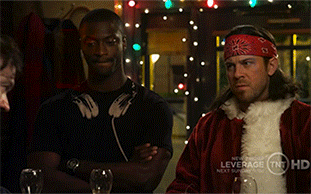
2. Found family: the OT3 edition. To answer your question, the OT3 is indeed canon, confirmed by the creator. Now, usually, “confirmed by the creator” infuriates me because most of the time it’s a way for a creator to be seen as “progressive” without doing anything to actually be progressive. That isn’t the case here. The OT3 are built up carefully and while it is obvious the creators didn’t originally intend for all 3 of them to become a relationship in the romantic sense, by mid-season 5 we are given a very clear picture of where Parker, Hardison and Eliot are heading in their relationship. There aren’t any kisses at the end to signal this but there are solid marriage vows in not only one but two episodes. (And by marriage vows I mean literal equivalents of marriage vows: “for better or worse” and “’til death do us part”. I’m not even exaggerating). The OT3 also doesn’t need explicit romantic narratives to convey how much they love each other. Their love is laced through the whole show, from the way they teach each other things to the way they respond to each other and work as a unit. The way they fiercely protect and admire each other. Like someone once said, if you need characters to kiss or say I love you to let the audience know they love each other, you are writing them wrong.
Aside from that, each of the parings in the OT3 are just. Gah. They are so well done, with friendship being the solid basis for them all. The creators never expect the audience to assume anything about them or fill in the gaps. They give us their relationships on screen and reference many things off-screen to show us how these relationships continue to build in between episodes.
Hardison and Parker are a canon couple and date in the show: it’s approached slowly and they are so goddamned sweet. They are basically every fluffy slow-burn trope with a healthy dash of mutual pining in the mix. They are basically that quote “love is patient, love is kind”. (I would like to add their romance never becomes the focus of the show or overrides the importance of any other relationship they have with the other characters, especially Eliot.)
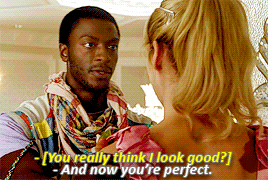
Hardison and Eliot are the Old Married Couple and from day one are already bickering and looking at each other/making comments that are found in every UST fic ever (not to mention Hardison has a very good knack for making Eliot grin like a little kid, when usually he’s basically an Angry Little Chef Man). They argue, they play, and love each other plain as day.
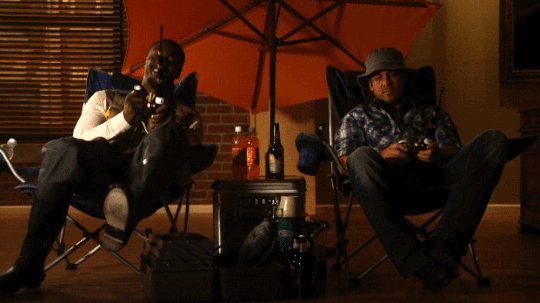
Parker and Eliot are more subtle but every bit as wonderful. They have an unspoken connection and understand each other on a level no-one else can. Parker and Eliot are not good with giving themselves over to affection for different reasons (and Hardison plays a central role in helping them realise it’s okay to want it and have it- that boy has endless patience) but there is something so beautiful in the way the two of them come together on their own and develop their own special bond that works for them. Parker and Eliot are that trope where the characters don’t need to speak to understand each other perfectly. They just do. Their love language is a lot of the time non-verbal but speaks volumes. (Parker also likes to annoy the hell out of Eliot and Eliot....just.....lets...her. Because he’s soft. The softest, grumpiest boy.)

I could go into so much depth for each pairing and their dynamics as a 3 but that's for another post.
3. Subverting stereotypes. There is the occasional hiccup in the show regarding stereotypes but ultimately, Leverage gets an A+ when it comes to writing characters and making them 3 dimensional people who are not defined by certain characteristics or events. Nate could so easily fall into the White Man Pain trope where he uses the trauma of losing his kid as a reason as to why he is entitled to act like a dick. Nate is a dick but he doesn’t use his pain to excuse it and I appreciate that. Hardison is a black man who is soft and nurturing. Easily the most empathetic and patient of the group. He’s nerdy, an actual genius, and has the biggest heart of all the characters. Nate is maybe the glue but Hardison is definitely the heart. Media’s usual aggressive, amongst other, racist stereotypes can fuck right off. Parker is canonically autistic (I am sure this was confirmed by one of the creators) and she is not defined by it. It’s not written as some kind of singular personality trait. It’s part of what makes up Parker but it’s only one facet of who she is and not once is her actions, thoughts or feelings treated like a joke. Sometimes people don’t understand why she does and says the things she does but it’s met with patience and fondness over the course of the show. Equally, it’s not met with over-caution. Parker is just Parker. No-one tries to change her. The other nice thing is Hardison, who always makes sure Parker knows she’s amazing because of who she is and not in spite of it. Finally, Sophie is in her 40s. She’s not treated like she’s past her prime. Ever. She’s sexy, smart and never is she pitted against or compared to Parker (who is younger) for anything. Sophie is amazing and there’s never even a conversation of “I may be older but I am still *insert adjective typically associated with younger women here*”. Sophie is possibly the first female character I’ve ever seen who isn’t just unapologetic about her age but has never had to apologise for her age. It’s a non-issue and that’s that. The women on the show are written so well, right down to secondary characters and it’s beyond refreshing.

4.) It’s just fun. The show has a “monster of the week” type format. Except instead of a ghoul or a ghost, the monster is some corrupt wealthy and powerful individual or organisation. The show draws on real-life individuals to do this and therefore closely parallels real-life people and events. It addresses important political, economical, social and environmental issues while at the same time remaining fun and light-hearted. The characters constantly get the chance to play dress up and by GOD do they have fun with it. You get to watch Eliot beat up bad guys in the most delightful of ways, usually after a witty non-sequitur and with a weapon you’d never think could be a weapon. The dialogue and back and forth between the characters is everything. And finally - my favourite thing- the team can never resist striking a dramatic pose after they’ve taken down the bad guy, making sure the bad guy sees them. I mean, they COULD just walk away, satisfied they’ve taken the person down, but nope. They gotta be dramatic bitches 24/7 and pose like they are models for every single month of this year’s Criminal Calendar.

5.) Competence Porn. So. Much. Competence Porn.
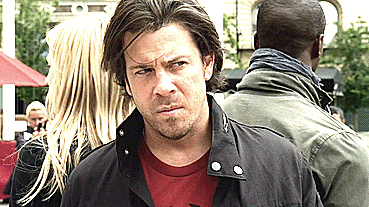
Honestly, I could list a thousand reasons for why Leverage is amazing but to list them would to be spoiling so many amazing moments you’d get to discover for the first time on your own if you do choose to watch it. It’s the kind of show you can watch with an eagle-eye and sink your teeth into. But it’s also the kind of show if, you would prefer, put on in the background for something entertaining while you do something else. Each episode is about the job at hand but it’s made up of so many moments between the characters that show how much the creators and writers care about them. You’ll laugh, you’ll cry, you’ll do whatever it is you do when something Soft and Wonderful happens that makes your heart melt. I am so beyond grateful for Leverage. It’s everything I always wanted in a show. Nearly every show I’ve watched in the past 10 years has disappointed me in some way, usually either because the writers run out of steam or characters who I love are treated poorly or given some kind of unnecessary “shock value” arc. Leverage doesn’t do that. Leverage is what it says on the bottle. Fandom isn’t something I joined because I needed canon fix-its. Fandom only enhances and celebrates an already excellent canon.
#leverage#leverage ot3#parker#alec hardison#eliot spencer#sophie devereaux#nate ford#talk leverage to me
7K notes
·
View notes
Note
hey since we've discussed that valentines special today/yesterday I wanted to ask if you have any expectations on what DC will do with this...because it was very unexpected that they'd even so much as directly imply Edward might be genuinely queer and not just vaguely queercoded - not to mention that it looks like that's actually confirmed canon now (at least in this singular instance)? And do you think that if they really do acknowledge it, that they might bring back the actor character (I believe his name was Antoine?) from the special, the one Edward had a past crush on? Since if they ever do intend to explore his queerness or give him a queer romance storyline that probably would be an interesting character to do it with, since he already knows about Edward's rogue persona (and apparently knew for a while and figured it out by himself too) and also seems to still think about him/still has some kind of feelings/is upset about not having prevented him from becoming a villain? feels like it could be an interesting setup for a storyline imo, should DC ever want to actually do anything with the whole confirmed bisexuality thing
Short answer: NO idea.

Long answer: I mean, it's not like "Dinner For Two" was slipped past DC Editorial somehow. For one thing, it was a Riddler comic being published immediately before a blockbuster movie in which Riddler is one of the central characters. And the last two Valentine specials before Strange Love Adventures (Crimes of Passion and Love is a Battlefield) both purposefully featured queer characters and stories. Edward would be the first character to be canonized as queer IN a Valentine special, but otherwise there's no reason to think that Ben Meares (editor for "Dinner For Two") or Marie Javins (executive editor of Strange Love Adventures) weren't aware of Ram V's intentions or the implications for Riddler's character. They're also both on the editorial team for a lot of current Batman titles (at least I'm assuming, based on how many recent issues of Batman comics are filed under their names on the DC Database), so it's not like they're disconnected from the Wider Batman Canon.
That being said, Riddler is a really weird character to have made canonically queer in DC's "good representation" era-- even though reforming (or pretending to reform) has been a persistent character trait of his, he's never been portrayed as sympathetically as, say, Harley Quinn or Pied Piper. And in recent years he's outright been a sadistic mass murderer, though that portrayal has definitely waned since the beginning of Infinite Frontier (his look and build have been steadily teetering back towards something more post-crisis, and in recent Detective Comics he's even lost the red hair and gone back to brown). DC is clearly looking to refresh his image-- maybe being bisexual is part of that process. The subtext has definitely been there for a while, and that's been a major argument from writers and editors for both Tim Drake and the newly-officially-asexual Connor Hawke.
If it does become a large part of his character moving forward, I imagine he would have to reform-- for the standard DC "good queer representation" reasons, but also because it's just really bad optics to have a canonically queer man kidnapping people and setting off bombs and such in order to get the attention of the straight hero. In this scenario I assume he could still be villainous in continuity-adjacent comics like Legends of the Dark Knight, but overall he'd probably settle into something like a PI background character?
As to whether he'll get a romance sideplot... if he does, I would guess he'd get a civilian supporting cast character, which Antoine Moray would definitely fit into. But romances never seem to last for Edward, so who knows. It would be cool if the recent RIddlecat content in Lonely City and Killing Time (at least I THINK that's what's been going on in Killing Time?) led to Edward and Selina having a conversation about their canonical bisexuality. Or Selina talking to anyone about her canonical bisexuality...
#riddler#edward nygma#all that rambling is still pretty much equivalent to 'no idea' though. for the record#also thank you warren white for providing me such a multi-use panel#i have gotten so much mileage out of it since february
20 notes
·
View notes
Text
About Annabeth
The recent casting announcement for the new Percy Jackson series felt like a slap to the face. After seeing the actors chosen, I was immediately filled with disappointment and anger for Disney, and even Rick Riordan himself. They had gotten my hopes up with promises to finally bring a faithful adaptation of the books to the screen, and then they immediately broke that promise. Frankly, I felt betrayed and heartbroken.
Obviously I have nothing against the actors themselves. They are just doing their best and I actually believe that they’ll do great in the show. They all seem to be talented actors, and any hate they get over something out of their control is not fair to them, and it definitely isn’t fair to them to ask for a recasting. In fact lots of fans of the series are quite happy with this casting decision. I can’t deny that the new trio look good together. As an artist myself, I’ve been especially interested in all the new fanart this announcement has generated. Yet, what I’ve found has been… interesting to say the least.
Even among those who are excited about the new cast, everyone seems to have a different opinion on how they want the characters to look in the actual show. While some artists haven’t changed anything about the actors appearances, others still depict Percy with black hair, and Annabeth with bleached hair, despite Rick’s claims that he doesn’t intend to do any such thing.
Among those fans who, like me, were disappointed in the casting, I’ve found comments begging for Annabeth to at least have her signature gray eyes, like they’re grasping for any thread of hope that this Annabeth could look anything like the one they grew up with. Others still have been forced to accept that they will probably never get to see a faithful depiction of the character on screen.
After Walker Scobell was announced as the choice for Percy, I was excited. I watched the Adam Project even before I knew that he was going to be Percy, so I knew that he was a good choice, and a good actor. I wasn’t concerned about the color of his hair because I thought it was a given that it would be darkened or something like that for the actual show. Dyes and wigs are common practice for movies and shows that want their actors to portray certain characters. Yet when Rick Riordan was asked if they would by dying Walker’s hair, he said this:
“We have had zero conversations about this. Personally, I think this is a non-issue. For me, finding the right actors has never been about hair color, eye color, skin color, or any other single physical trait, even if they were described a certain way in the books. As many of you know, I flubbed such details myself several times in the series. Thalia’s eyes changed from green to blue. Oops! Annabeth’s hair was curly and then it was straight. Nico was described as olive-skinned, then later as pale. Blackjack even changed from a mare to a stallion over the course of two books. Whelp, not sure what happened there, but too late now! If I may invoke the Movies That Shall Not Be Watched, I know a lot of you cared deeply and were unhappy when Annabeth turned out to be a brunette rather than blonde, but for me, that was never the main issue. What mattered were that those actors, as talented and wonderful as they are, were WAY too old for the parts as I wrote them, and their age was central to the plot. What I want to see are age-appropriate actors who can embody the personalities of the characters, nail their voices and their sense of humor, and make you believe: “Yes, that is Percy. That is Grover. That is Annabeth,” even if they’re not exactly how the characters were described physically in the books. Again, that’s just my personal opinion and my approach. So blond Percy? Hey, why not? IMO Walker is awesome just as he is. He is perfect for the role.”
There are several issues with this. While I agree that appearance should absolutely not be the #1 consideration when looking for the right actor to cast for a project like this, it shouldn’t be completely ignored. This show isn’t a middle school play, it’s going to become one of the definitive versions of the Percy Jackson franchise. I’ll get back to that later.
@takaraphoenix on tumblr said about this quote from Rick:
“What I’m reading here isn’t “racebending the characters doesn’t matter because the important thing is the essence and energy the actors bring”, what I’m reading here is “racebending doesn’t matter because I’m a shitty writer lol.” Because that’s what he’s saying. He’s saying that the actors’ physical appearance doesn’t matter because he never cared enough to remember what his own characters look like to begin with.
“Sure, in its very essence, what eye-color Thalia has doesn’t matter all that much, but it’s about what this represents. This represents that he doesn’t even care enough to know his characters, when every die-hard Percy Jackson fan has greedily soaked up and memorized every tiny little detail of description that he has given us because we actually love these characters.”
Now, this is a pretty harsh evaluation, and I don’t really believe that Rick doesn’t care about his characters or the way they look, (or at least, he didn’t) and I’ll get to that in a bit, but Takaraphoenix is right when they say it comes off that way.
Adding on to this, the examples of inconsistencies and mistakes that Rick gave are minimal compared to what he’s trying to justify with his casting decisions. Eye color is hardly noticeable in real life unless you get up in someone’s face. If you showed me two people who looked the same except one had blue eyes and one had green eyes, I’d still say they could pass off as the same character. I can look at Daniel Radcliffe in the Harry Potter movies and still say he looks like Harry from the books, even though his eyes are a different color. And they even tried to give him green eyes, and then gave a valid reason why it wasn’t feasible. And people were okay with that!
As for Annabeth’s hair changing from curly to straight, that’s a pretty superficial change. For example, I have naturally straight hair, but when I curl it, I still look like the same person I was before. The difference between changing the way hair strands fall and changing a character’s entire color palette is vast. Not even comparable.
Rick mentioned that what really mattered to him about the characters were their personalities, voices, and sense of humor. I agree with this. Characters can still be distinct in all these aspects without having a distinct appearance. Describing the way a character looks isn’t essential to writing a good story about that character. For example, possibly my favorite book series of all time, The Jack Blank Adventures by Matt Myklusch, features several main characters who never really get full physical descriptions, yes they still have fully fleshed out personalities and voices. It was done so well that I never even realized there was no physical description of Trea until I saw some artists drawing her in ways completely different to how I had always imagined her. And I wasn’t upset about it. After all, my version of Trea was purely my own interpretation, and theirs was their interpretation. Her appearance genuinely was not important to her character, so it just… wasn’t there. All you really get about the physical appearance of most of the characters in Jack Blank Adventures are offhand comments every once in a while, vague descriptors that could mean anything and are important to the character like “she was beautiful,” or worldbuilding tidbits, like the aliens that have silver skin. Rarely is there ever a paragraph entirely devoted to describing a character’s appearance. This isn’t unique to this series either. There are tons of works in literature that get away with describing very little about the way their characters look, and they still manage to be compelling.
This brings me back to the point about Rick claiming that he never really cared about the way his characters looked, and only cared about their personalities. Really, Rick? Then please explain to me why one of the very first paragraphs about Annabeth explicitly states her physical appearance, including skin tone, hair color, and even eye color, and why this same description stays majorly consistent and is brought up again and again throughout the series. If it really didn’t matter, those descriptions could easily have been left out entirely.
And to all those who think the reason most of the hate is directed towards Annabeth and not the other two main leads just because she’s black, at least in my case, it’s not because of her race, it’s because Annabeth had the most concrete and repeated physical description out of any of the other characters in the series. Youtube artist Lavendertowne said in a video where she was attempting to draw the Percy Jackson characters as true to the books as possible:
“I had about twice as many notes about Annabeth as I did about either of the male main characters. She just gets described a lot, and so it makes it even more starkly different between the actress that they picked and the way that they styled her versus the character that she’s supposed to be.” (7:09 - FIXING THE WORST MOVIE ADAPTATION EVER: PERCY JACKSON // By the Book: Episode 4)
This video came out three years ago, and so the actress mentioned is of course Alexandra Daddario from the awful movies, but unfortunately this still applies to Leah. Rick was even aware that the fans were upset by dark-haired Annabeth in the movie and decided to brush it off without really considering why the complaints about her were mainly physical, while the complaints about Grover were more from a writing standpoint. And the reason is because Annabeth’s physical appearance is really hammered in in the books while Percy and Grover were always a little more detached from their appearances, especially early on, partly because the books were from Percy’s perspective. In Heroes of Olympus, Percy’s appearance is much more solidified and mentioned more often once we get to see how the other characters see him.
Grover is one of those characters who never really got much of a physical description in the books other than of course the worldbuilding aspect of him being a satyr. As far as I can tell, all the official artwork of Grover depicts him as caucasian, but that was genuinely never as important as his personality, which the awful movies completely butchered. I actually have really high hopes for Aryan in this role, and I’m excited to see how he portrays Grover’s sweet, nervous personality.
The last point I want to touch on is the one I’m sure a lot of people would rather avoid. You see, regardless of Disney’s or Rick’s actual intentions when choosing who to cast, they must have been aware of what making a decision like this would suggest, given the current political climate. At first, I was willing to give Rick the benefit of the doubt on this. He seems very happy with the casting decisions and Percy Jackson and the Olympians is a series that I would say is basically free of any kind of identity politics. I didn’t like his decisions, but I was willing to accept, and hoped, that he really did believe that these kids were the best choices to portray his character’s personalities, like he said, even if his arguments and justifications were rather… weak. Especially considering how many auditions they must have received from other girls who probably would have also done a good job as Annabeth, and who actually looked the part.
Then I remembered that the reason I stopped reading The Trials of Apollo was because it had started shoving more of the identity politics side of things in my face. And since then I’ve been really worried that this author would sacrifice the integrity of his characters that are loved by readers around the world just to enforce some kind of political agenda.
I think at this point what I’m actually mad about is that I feel lied to. Rick promised us a faithful adaptation of the books, not a new twist on characters we love. If the new series had been advertised as a more of a reboot, or a Brand New, Never Before Seen take on Percy Jackson and the Olympians where Rick was able to make changes he wished he’d made in hindsight, at least I would know what to expect. And as a writer myself, I can respect wishing you made different decisions in previous writing with new perspectives.
After all, a big part of the reason why nobody liked the awful movies is because even as standalone films, they were just… bad movies. My hope now is that the Disney+ show will still be able to be a good show, even if it clearly isn’t going to be the completely faithful adaptation that it promised it would be. If the writers aren’t bound by the books when it comes to casting, who knows what kind of decisions they’ll be able to make with the plot and characters. I’m just crossing my fingers and hoping that any changes made to the script will be improvements on the original story, and not woke bullcrap.
To sum up, I kind of swung from hating the decision to make Annabeth black but giving Rick the benefit of the doubt and wanting to trust him, to actually seeing lots of potential for Annabeth’s character growth with this new perspective, but also realizing that those who cast her in the first place probably had ulterior political motives. At this point, I’m curious to see if Leah will be able to overcome that and come into her own as Annabeth 2.0, and not just- Annabeth, but she’s black and totallywasthewholetimedefinitelythisishowshewassupposedtobeallalong. Because she wasn’t. And if Rick believes that, he’s delusional.
If you somehow read through this whole thing I just want to say thanks, whether you agree with me or not I appreciate being able to see everyone’s perspectives on this. It was kind of a big ramble that I just drafted up this morning.
#annabeth chase#PJO#HOO#percy jackson#percy jackon and the olympians#grover underwood#riordan universe#riordan books#rick riordan#leah sava jeffries#walker scobell#aryan simhadri#disney#jack blank adventures#jack blank#trea#lavendertowne#harry potter#daniel radcliffe
13 notes
·
View notes
Text
since like one (1) of u asked.
the thing is that typically - historically - romance is written by women. i mean it, even when you go all the way back to the nineteenth century, the modern form of the romance novel was very much being codified by women. 20th century america is considered the peak of the romance novel, and it was practically all women. the historical romance genre is dominated by women. even the early 2000s trend of really weird erotica was mostly women.
this doesn't happen in india. famous romance novelists in india have been men for some reason - you have your chetan bhagat, ravinder singh, durjoy datta - the whole lot, yk? like you might have the occasional preeti shinoy or whatever, but on the whole the really cheap paperbacks are always going to be male writers. and if you ever sit around and wonder "ok but why is romance writing in india mostly men???? that's really weird it doesn't usually happen like that" the answer is the same for practically all of the issues you run into with writing in india. caste.
in this case, the answer is also really fucking bizarre. the reason why romance writing in india is dominated by upper caste men is because typically, women who have access and leisure to english writing publishing are upper caste, and they cannot be allowed to write romance. romance has too many connotations of titillation, cheapness and being available for the lowest common denominator, and you cannot allow the purity of upper caste women to be associated with that sort of thing.
that's really the bottom line of it. at least, that's what my diagnosis of the problem is. there's this really great essay by rachel dwyer on the indian on screen kiss - i think it's in a book edited by francesca orsini - and she comes to a similar sort of conclusion about why kisses cannot be permitted on screen in india. that upper caste actresses wouldn't want lower caste male audiences to see them like that. similarly, no one wants upper caste indian women to write romance that can be read by practically anyone - thats why when you have women in the indian publishing world writing romance, the marketing is really different! compare an anuja chauhan book to a chetan bhagat - she's an upper caste woman, the cover art for her book has those markets. it's typically priced higher, too - an anuja chauhan is going to cost you rs 350 to chetan bhagat's rs 150. there's more female writers in the market now, but i'm usually sus.
its really hard to make lists of good romance writing in india because of all these factors. i have no problems with durjoy datta and all (i think my sister loves his books) but i genuinely find it hard to get into romance written by men. HOWEVER, all of that being said, here's some of the books i've really liked:
1. Keep the Change by Nirupama Subramaniam: ok so like i read this when i was fourteen, so take this recommendation with a pinch of salt. it is painfully upper caste and tam-brahm, but i also remember it being a genuinely really funny book. also, this is a sort of one of the first examples of what is going to become a popular romance form in india - the corporate romance: cosmopolitan, sexy, urban. it's funny and all that, but it's also like a telling example of what's about to come. it's strangely like sex and city, and it is an interesting book in its own right just because of that.
2. Stupid Cupid by Mamang Dai: this is less like a tradition romance book but i,,,, love mamang dai. she's a writer from arunachal pradesh, and some of her other books are just..... *chefs kiss*. this one is lovely because it has two of the things i love: delhi and romance. a woman runs a boarding house where people come and fall in love, and it's just about delhi and it's emotions.
3. Those Pricey Thakur Girls/The House that BJ Built by Anuja Chauhan: i know i spent some time critiquing the politics behind chauhan's writing, but these two books are genuinely so funny, so well written and so cute!! especially the second one, i love that book in particular. chauhan also seems more clued in to the caste politics that back her up, but she's still on thin ice because she loves her rajput heritage. the first book is set during the emergency and has a pride and prejudice vibe, of four unmarried daughters. the second one is modern day and its more unbelievably but way romancey-er for me.
4. Gulab by Annie Zaidi: i was wondering whether i should put this book in or not, because it is less of a romance and more of a ghost story. it is a mental mind fuck, for what its worth, and really lovingly written about a man's first love. genuinely a bit creepy in parts tho, as ghost stories often are.
5. Umera Ahmed's writing: she's pretty central to the Pakistani tv drama, and a lot of her books were adapted for pakistani television. the most famous example of this is probably Zindagi Gulzar Hai, but my favourite would probably be Daam. ahmed's writing was read in translation by me, as my written urdu is really bad. these cannot exactly be classified as romance, but she does deal with love and what it means for women. one thing to be careful of when reading her writing: she is anti ahmaddiya. i won't pretend to know much about pakistani social politics, but i know that that community is very severely discriminated against.
6. Prem Kabootar by Manav Kaul: this book is in hindi, and it's a short story collection. there's an english translation callesd A Night in the Hills, but i cannot vouch for the veracity of the translation. i did love the hindi tho, the titular story is really cute! it is a lot about love and romance in different forms and times while growing up. i even had a chance to watch the play version of that story back in the before times.
Books That Aren't Good, Per Say, But Interesting To Read Category:
7. Once Upon a Curfew by Srishti Chaudhry: ok so like this book is another one set in the emergency but its really bad. its slow paced and the character growth doesnt happen naturally. the romantic hero is quite nice but the lead just doesn't make herself likeable. it's also got some veiled allusions to upper caste delhi university college cultures, and like in a celebratory way?? but on the whole its interesting to read because the emergency only just became an acceptable thing to write about, and it is interesting to see how writers are dealing with it, if you know what i mean??
8. Unmarriageable by Soniah Kamal: ok so this wasn't good, like i feel like it fundamentally misread a lot of what pride and prejudice was about BUT it was interesting because there seems to be a rise of pakistani authors who look at austen. even Austenistaan by Laleen Sukhera is an example of that. i didn't have fun reading this but it's definitely interesting to read. it's nowhere close to my favourite south asian adaptation of austen, but that's a story for another time.
and that's really all i have because thats just how romance genre is in india. i will say this, though: you will find more interesting romantic story telling in hindi writing - even if it is by men. i have a copy of October Junction by Divya Prakash Dubey i was going to get at during the midterm break, and i will report on that in detail whenever i do finish it. in the meanwhile, this is genuinely all i have. on the whole, i really think you can also find far, FAR more interesting ideas of romance in cinema from india. and i don't mean bollywood (although some movies are pretty good!), i mean regional indian cinema!! some marathi movies have such lovely romances, and there's a few malyali ones that are really nice too!! once again though, thats a conversation for another time.
#romance writing#south asian writing#south asian romance#book recommendations#hello void this is ridiculosity#indian politics#indian writing#booklr
69 notes
·
View notes
Text
Zero is Null
A discussion of Zero’s love-hate-relationship with RvB and struggling independence; including a hotdog too big for the bun, tragic backstories, a single bow-chicka-bow-wow, and a cookie at the very end.
Welcome to what will be a lot of text. Basically, it will explore why Zero fails as an RvB (with emphasis on RvB) season. I will not be the first one to bring forth some of the points, and I promise to be fair and civil and fun. This isn’t supposed to be a piece of hate – in fact, I’m writing this because I love Red vs. Blue.
Okay, first of all, to increase your fun – take a guess on just how much of Zero is spent on fight scenes. You see, I’ve calculated the exact amount, and I will reveal it later, but for now, take a guess and remember the number. Maybe you are the winner!
Alright, time to share my thoughts. Wait! Since I suffer from anxiety and have this one annoying voice pretending to be all those critical statements my opinion could be met with, let’s give it an actual voice and address the points throughout this review.
“Why would I care about your opinion, Ria?” – I don’t know, you’re the one who clicked Read More.
“Your opinion doesn’t matter!” – Of course, it doesn’t! Geez. Do you think your opinion matters, though? Listen, we’re on Tumblr, the actual equivalent of screaming into the void. And it’s fun, too!
“If you don’t like it, don’t watch!” - *activates Uno Reverse Card* “You can’t talk about something you haven’t watched!”
“You’re just a Hater” – Actually, this is a point I’ll come back to. Like a cliffhanger. Also, at the end of this, there’ll be a cookie. But this will also include me talking about the stuff I like, because, surprise, Zero is not without talent!
“You just don’t like it because the Reds and Blues aren’t in it!” – Actually, that’s a good point, so instead, this review will start with a sole focus on Zero and discuss the problem that lies within that story. Then we can address why the lack of OG cast is understandable and problematic and weird.
But first! Backstory.
When the first 5 second teaser dropped back in spring (you know, when we were young and innocent and the world didn’t feel like an apocalyptic movie yet), I held onto that one image of what I thought (hoped) to be Grif and Simmons in the sunset, hopefully addressing Grif’s hateglue arc, but boy was I wrong because a) that’s not Simmons, that’s Sarge, and b) the image was from a PSA since the Reds are not in Zero.
Actual face-reveal of me below:

Admittedly, when I heard that the Reds and Blues were not going to be the main characters (or even show up), it felt like a gut punch. However, I actually found myself getting excited due to the creators’ hype. I want to praise them for this. It’s been a while since an RvB season was talked so much ABOUT before its release; it had advertisements, it had creators and voice-actors talking about it. Please. More of that in the future. Their passion rubbed off on me, and that deserves recognition. So it pains me that this was clearly a passion-project, and then when I gave it a try, I didn’t want to touch it again for weeks.
Here’s the thing. I cannot whole-heartedly say that Zero is bad. It’s not gonna melt your eyes. It’s not even so-bad-it’s-good. For me, it’s meh. It’s a Saturday-morning-cartoon aimed for a younger audience with a rushed plot and clichéd characters. The problem is that it calls itself RvB, and with that title comes something to live up to – but more importantly, something to continue.
My main issue is that Zero forces its story into existence by ignoring established content rather than adjusting to it. Let’s call this for the hotdog-too-big-for-the-bun syndrome solely for the sake of the bow-chicka-bow-wow that’s coming now. Bow-chicka-bow-wow. Many of the separate issues I will dive into all add to this hotdog-issue, so I will scream “Hotdog!” whenever this is the case so we can all keep track of my argument.
You can continue the story of Red vs. Blue without the Reds and Blues. While that would personally crush my heart, it can be done. There’s a story of Red vs. Blue that can be continued. The world can be expanded, the previous actions of the Reds and Blues can be explored from another angle.
So.
How does Zero do this? It doesn’t.
I just want to make it clear that new elements can definitely be added when it comes to worldbuilding. That’s literally the point of sequels. But Zero’s settings are presented with so little grace and with no connection to previously established worldbuilding. We get Alliance of Defense and GLASS thrown in our face as very big important organizations – yet we’ve never heard of them before. A big central plot point of RvB is the UNSC and Project Freelancers, and those were introduced naturally with the plot. We already have big established intergalactic organizations. What is AOD’s connection with those? We aren’t told. We are just told they exist and expected to accept it, no questions asked. If this was a whole new world and story – fine. But when you need to build on an already established worldbuilding, you need more grace than this. Chorus was a whole new setting, but it was explained, and it was connected to the previous plot. Same with Iris. Same with Desert Gulch. In Zero, it feels lazy. It feels forced. These organizations are just there because the story is built around them (HOTDOG).
This vagueness when it comes to wordbuilding is also reflected in the settings - we have a desert, a training base, a lab, temples, Tucker’s workplace, and we do not know if all those are set place on the same planet. If that is the case, what is this planet’s relationship with Chorus? Is it Earth? And most importantly, what is the deal with the temples? Why are they connected to Tucker’s sword if it isn’t the same planet. Are they made by the same aliens? Are people okay with this? Why haven’t these temples been explored before? Chorus makes sure to establish this, while Zero doesn’t, adding to a growing amount of confusion.
Okay, so no connection with previous worldbuilding. What about characters? I mean, we got Wash and Carolina and Tucker! So we have RvB characters, it gotta be RvB! Technically – yeah. But it feels dirty. These three characters are not here to be characters. They are here to be props to the new cast. They are not given any development. Their presence isn’t even that important, and if this was a whole new show, they could easily have been replaced with an unknown face. Worst of all, they feel miswritten.
Carolina and Wash are working at a new military organization? Leaving the Reds and Blues behind? To help people? First of all, fucking bad idea, Carolina, the last time you left the Reds and Blues alone, they changed the timeline. But most importantly – Carolina and Wash just joined this new super elite military organization? After being mistreated and manipulated by such an organization in the past?
Carolina is there to introduce the characters. That’s it. We are force-fed their personality by having her literally read out loud their personality. There is no gentle introduction to the new cast. We are not allowed to get to know them naturally. Why show when you can tell, huh? That’s Carolina’s role. That’s why she is there. To introduce the cast and explain their story. That’s it. (HOTDOG).
How about Wash? He is there to get beat up and be a damsel in distress so that the new cast has a reason to explore the plot. Oh, and that brain damage that was the consequence of previous seasons – gone now. The guy who literally has trauma from having an AI explode inside his head is fine with having a computer inserted into it instead. Because that’s needed. To explore his brain damage wouldn’t work now when his role is to be a prop to lure the new cast for one episode and then be put onto the bench for the rest of the runtime (HOTDOG).
And Tucker – he is there to die for a second and have his sword taken from him. That’s literally it. And for the few moments he is there, he feels like old super flirty Tucker, which erases the character development he went through in previous seasons. Okay, so Tucker dies, and then not dies, and then he is put on the bench with Wash where they can sit and talk or whatever (‘cause holy shit, the new cast is not allowed to that), because he isn’t important. The sword is. Tucker is just a prop, even more than his sword is (HOTDOG).
Damn. Wash gets beat up. Tucker gets beat up. Dies. Gets his sword taken away. Almost seems like a Red’s wet dream. Sorry not sorry, Blues, you were done dirty.
So there are miswritten old characters. Even worse is the retconning. The plot needs a “normal” Wash, so, bam, magic computer solution. Never mind Wash’s trauma and character traits. Never mind the logic of the new worldbuilding which also includes a character suffering for years to heal an illness. But the brain damage that was such a big consequence that it became the main part of the plot of the last two seasons – gone. I mean, a gunshot to the head can be healed by CPR. That’s canon. But no one gave Wash CPR so it’s a big thing, okay. It was canonically a big thing, and Zero erased that. This is not me saying that a Cerebral Enhancer couldn’t work in the RvB universe. Imagine it being done right. Wash struggling with the choice of getting used to his disability or accepting the possibility of help - at the cost of reliving his trauma. The struggle between what to choose - what should he choose when he wants to help as many as possible, the sacrifices he thinks he has to make, the way it could have been used as a part of his character growth. But in Zero, the enhancer isn’t a part of Wash’s character. It’s there so the story can work without having to deal with the previous plot’s consequence (HOTDOG).
Same with the sword thing. They sorta explain it by having Tucker flatline, but it’s weak. Honestly, I find it sorta offensive. What about Locus’ sword as well? It’s twisting previous lore to make the new plot work (HOTDOG). (Also, are we not gonna talk about the ultimate power being Spencer Porkensenson’s helmet? Have the writers forgotten Spencer Porkensenson? Have we as a community forgotten Spencer Porkensenson?)
If you have Red vs. Blue in your title, you cannot ignore what you inherit from it. You need to respect the worldbuilding, the established characters, and the previous plot. Zero does not do this.
Let’s talk about the Triplets. No, really, let’s do it. I don’t think I’ve ever talked about them before, because season 14 was a mixed bag for me (that I have now learned to appreciate. Thank you, Zero.) because I have heart at the size of the Grinch and can only love a few characters at a time, and that did not include the Triplets. Can’t even remember their names. Well, I can, but I can’t for the love of me remember which state is which, and my tongue is twisted every time I try to say Ohio, Iowa, and Idaho, and I know it’s on purpose. I know it is. And it got me good. That being said, the fandom actually embraced them really, really well! Seriously, I’ve seen more content for the Triplets than for Zero as a whole.
Why talk about the Triplets? (Was Iowa the lesbian? Or was it Ohio? Fuck.) Because like Zero, they introduced new characters with a story of their own. The Reds and Blues didn’t play a role. But here’s what I feel like the Triplets got right. They didn’t change the settings to force their narrative. They used stuff already established (Project Freelancer), added their own story as a continuation of that. They even included old characters in the beginning (Wash and some other Freelancers) but it felt natural and it didn’t feel like it happened at the expense of the old characters. Wash’s writing felt natural, and his presence wasn’t needed to tell these new character’s stories. He wasn’t a prop to them. He was there to establish the setting and to establish the relationship with these new characters, and then he and the other familiar faces (helmets??) left, and we as the viewers were left with these new characters. And the new characters told their own story by themselves. It felt like, hey, here’s something you know – remember Mother of Invention, and remember Wash’ lower rank, but now, try to imagine being even lower rank than him, aren’t you curious about those fates? Now let’s hear their story! It was new, it was something else, but it didn’t wreck what came before it, and it stayed true to the classic vibes of RvB.
As I said before, the hotdog-issue is my biggest problem with Zero. It infuriates me. I will return to this. But there are more issues, even if we try to look past the title-related problems.
If we try to imagine Zero as its own story and universe (as it should be, in my opinion), it still earns the meh review from me.
These isolated issues include awkwardness, the writing, lack of self-awareness, and pacing. First of all, holy shit, this is a tell, don’t show. Nothing is subtle, nothing is allowed to develop. It’s like the show thinks you are six years old with an attention span of a goldfish. You are not just led by the hand – they have literally pulled off your arm by the end of the show. We are force-fed every bit of information, every bit of personality from these new characters.
The voice-acting is a mixed bag for me. Sometimes it’s pretty good, sometimes it’s not. Some of the problems can definitely be blamed on the dialogue that you can only do so much with. It’s not good. I can’t remember any good jokes (the one joke I really appreciate was the cast on armor, and that was freaking visual humor. That was so RvB. Kudos to that. It was fun. More of that, please.), and RvB is known for having memorably good lines. This is a show built on good, clever, funny dialogue. Zero does not deliver. You have to sit through clichéd lines – “You’re not my dad”, “I trusted you”, “Come with me”, “It can’t be!”, “She’s way too powerful”, and “We have to do this together” – performed unironically. I cringed more than I laughed. Worst thing is that Zero could be a good parody. Sometimes, it feels like it is. One-dimensional characters, a villain wanting ‘the ultimate power’, very overpowered characters, bad one-liners, etc. But Zero takes itself seriously, and I was one of the people rooting for Jax to show up at the end and yell “Cut”. That would have been a funny-as-fuck twist. A spin-off parody. If I can’t have “Sarge the Movie”, I would have taken that and loved it. I would have forgiven everything. “We put so much info into finding that power, but we had no idea what it was” is really a line in the finale, and I cannot believe this is real in a show that somehow still tries to present itself as serious. What a plot.
We have to talk about pacing. God, first of all it should be stated that RvB is a mess when it comes to pacing. I honestly get what they were going for. Sometimes, RvB has come across as a bit boring when you get three episodes stretched over three weeks without much going on. I know season 11 did not have the warmest welcome because it was seen as boring until the finale. But when you see season 11 as a whole, as a movie, as a part of a trilogy, it works so well. Zero is more focused on being episodic. They want something to happen all the time so we will stay tuned. The thing that will happen – a fight. Oh god. The fight scenes.
I have done the math. I have run the numbers. I deserve a freaking cookie for this. Are you ready?
If you put all the episodes together, you have a runtime of 106 minutes. HOWEVER, with the introduction of credits in every episode, you gotta account for this. Removing the credits, this gives us 94 minutes of actual runtime. Out of that, 45 minutes are dedicated to fight scenes. That means 48% of the show is fight scenes.
If I wanted that many fight scenes, I’d watch Death Battle. Except the actual RvB Death Battle episode has a runtime of 20 minutes, and out of that, 5 minutes is dedicated to the actual battle. For the people who hate math – that’s 25% of the actual runtime.
RvB Zero has more fight scenes than a show called Death Battle. Take that in.
The pace suffers from this. Where’s the time to explore the characters? Where’s the time for good dialogue? All I can think of is this:
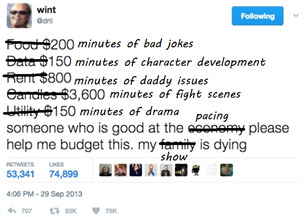
I get that RvB is a show that’s literally making fun of itself by acknowledging all their characters do is stand around and talk. I get that you want characters to do more than that. But for the love of Church, would it kill the new characters to stand around and talk? For just a minute? Stop fighting, I am begging you, stop fighting! Am I a pacifist now? Am I purple? Have I joined Doc’s team? What has Zero done to me?!
The good thing though is that fight scenes are very good. They’re entertaining. However, they seem to deconstruct themselves when we need to get a fight scene in every episode. Usually, the few fight scenes in an RvB season were in some of the most climatic episodes. In Zero, I can hardly keep up with the pace because they won’t stop moving. Fight scenes aren’t plot. They aren’t character development. You need more than just fight scenes. They entertain, but there’s a limit to that.
Noël Wiggins, the co-writer, stated the inspiration was a Saturday-morning cartoon. They nailed that vibe. If that was their goal, hurray, they have accomplished something! Because of the poor plot and constant fight scenes, it feels like you could just switch on the TV and drop in at any moment and let yourself be entertained by the cool and colorful soldiers punching and kicking each other. I will admit that the fight scenes entertained me. But they don’t make it a good season.
If I were the six-year-old with the attention span of a goldfish that the show believes I am, I honestly would enjoy it. The stiff dialogue and the constant tell-don’t-show makes you feel like an audience that’s not supposed to do anything else but admire the flashy fight scenes. I miss the cleverness of RvB. I miss the characters I get to connect with as I see them grow.
I miss the tone of RvB. Because this isn’t RvB to me.
It’s not that RvB hasn’t changed its tone before. Holy shit, I sorta do want to experience the absolute shock the RvB fandom went through when s6 aired and they were given new characters and serious plot. I would have loved to experience that, but I was too busy being ten years old. The Freelancers seasons also introduced a new tone and more fight scenes with very talented fighters compared to the Blood Gulch gang, but a balance was kept by having half of the season still revolving around the Reds and Blues. But Zero – Zero is so much change. And it’s on purpose. At least this has been made very clear from the beginning.
They constantly seem to appeal to new fans, rather than be directed towards older fans of the show. If you want an entirely new audience with a season with a new cast, new worldbuilding, and new tone, I’m confused as to why they don’t just make a new show. The hotdog-problem begs for this solution. This story and environment and characters feel so out of touch with the original RvB, that with a few rewrites and lack of Halo-armor, it could just be a new show. Problem solved.
If not this, then present it as a spin-off. In all ways, it feels like a spin-off (again, see everything marked HOTDOG). But the creators refuse to do this, and I don’t understand why. I could forgive many of these issues, had they officially separated themselves from canon.
Ah, what’s the idiom? You can’t both swallow and blow? (You can hear the Bow-chicka-bow-wow in the distance). Something about eating cake and having it. Forgive me, English isn’t my native language. POINT IS why are you calling yourself RvB while actively fighting against the core essence of RvB? In my humble opinion, you can’t be both. Marketing it as a spin-off would have granted it some defense when changing, well, literally everything, and I just, would someone please properly describe why it isn’t a spin-off? Isn’t this season marked by its association with the plot of RvB rather than a continuation of it? Zero presenting itself as not a spinoff feels like a toddler clinging to the hem of its mother’s dress while forcefully running away from her, ripping the dress in the process.
When they do connect with the original RvB, it leaves a bitter taste in my mouth. When they let Carolina, Wash, and Tucker appear for a moment, it feels like luring viewers in with the RvB title. Look at me. Look at me! I’m not saying this is the case. I say that it gives me the annoying vibes of being lured, rather than letting the characters be a part of the show for their own development, rather than having RvB in the title to continue its story. I should not be getting these vibes at all. But I am.
If you want to use RvB in the title, something from the core of RvB needs to be embraced. Things can be changed. They should. Something new should be brought in. But there’s a limit to how much you can change and replace and twist until it would have been better with an original show. As a season of RvB, it should tell the story of Red vs. Blue.
From my perspective, Zero fails to do so.
It pains me that the old cast has been replaced, but as stated earlier, a season could have worked without them. However, I do not like the take that one should be excited about all the new characters. That it isn’t a big thing that the OG cast got replaced. That we should just deal with it. Just, try to imagine another show suddenly replacing the main characters with characters we’ve never met before. Imagine RWBY suddenly only focusing on a new team of huntresses with the previous main characters reduced to an Easter Egg presence, or Camp Camp suddenly being about a new team of campers, no warning given. Can you imagine the outcry? So maybe let’s agree that a replacement of the main cast is a big thing and should be addressed and it’s valid to be upset about this change.
Could Zero have worked? It’s hard to answer this. How can I accept something as RvB if the season actively pushes away the core of RvB aside for an isolated story that could have been told in any other media? As a spinoff, I could have ignored it. To enjoy Zero, I have to fully separate it from RvB in my mind, and then it’s alright. S’not good. But it’s not bad. It’s entertaining enough. I really ended up liking Raymond and Tiny, and there were a few good jokes, and the fight scenes were admirable (but too much) and I love the creators’ passion. But it’s not RvB. I also wish that the new characters had been attached to previous worldbuilding, for example soldiers on Chorus or agents from Project Freelancer. That way we could build on familiar lore which would have decreased the confusion and added a much needed connection with the previous seasons of RvB.
God, the anxious voice is back (by the way, it sounds like Tutter from “Bear in the Blue House”).
“You’re racist” – I hope not. Literally, I do not want to be. Tell me if I’ve ever crossed some lines, because I swear, that is not my intention, I will apologize and most of all, change and do better. I included this because I’ve seen this take thrown around in the big ugly mess that is the fandom clashes regarding Zero. And racism is problem within RT community (this includes AH and RvB, sorry, I just use RT as an umbrella term for the latter), and I’m not saying it hasn’t been a problem with this season. Writers should never be harassed, and never-fucking-ever because of their skin color, and voice actors shouldn’t be treated like they are responsible for the choices of the show. But I was legit nervous to post this review, and I hope it’s been factual without feeling like personal attacks on the creators because that has never been my intention. I was delighted to hear about the diversity behind this project, and Torrian’s passion legit blew me away because it’s been a while since I’ve seen that for an RvB project. I’d hoped for it to be good, and when I feel disappointed, it’s for the reasons stated in this analysis. That said, Zero is made by a diverse cast and it’s made with love, and both of those things are so, so great, but it does not mean that Zero cannot be criticized. It can, and it should. It’s a product, just like all the other seasons, and fans are allowed to discuss it – both what they loved, and both what they found troublesome. And to repeat previous points, and be respectful, always, fuck racists, and never-fucking-ever harass the staff behind a season, what the fuck is wrong with you if you do this.
“Don’t you get it, it’s different because it’s trying something new!” – Hey, remember the philosophical question: if you replace all the parts of a ship one-by-one, is it still the same ship when you’re done? If it doesn’t include the Reds and Blues, if it ignores previous plot, if the old characters feel miswritten, if it values animation over dialogue, if it values fight scenes over comedy, if it wants to be Fast and Furious instead of Red vs. Blue – is it still Red vs. Blue? Because it doesn’t feel like it to me.
“It's been 17 seasons, it’s time to let the Reds and Blues go so someone else can shine!” – I simply do not understand us having been with the Reds and Blues for 17 seasons should be an argument to let them go, rather than be an argument as to why their absence hurt like hell.
“The Reds and Blues ran out of things to do!” – Did- did they, though? I mean, if we were discussing pretty much any other show, I’d probably agree that they were running out of content. But for the Reds and Blues… I think the PSAs nailed it this year! I’m not kidding, I had more fun watching the Reds and Blues discuss how to do laundry than watching Zero. You could literally give me an hour of the Reds and Blues trying to bake a cake or clear a gutter or simply settling down with an ordinary life, and I would trust them to make it worth the watch.
“The flaws were due to the fact it’s only 8 episodes long!” – Look, I can only judge a product the way it’s presented to me. I cannot come up with excuses for it. If they had 8 episodes to work with, they need to come up with a plot that works with this runtime. Seriously, this excuse cannot work when 48% of the season is spent on fight scenes. They could have used more runtime, sure, but the show needs to be able to pace itself and be planned accordingly.
“The OG cast couldn’t be a part of this year, hence Zero!” – That might be true. But. Would one year without RvB kill it? Is Zero necessary? Again, I just can’t judge excuses for the show. But trouble with the cast has been an issue before. Season 15 solves Geoff’s sabbatical by actually making Grif’s absence a part of the plot. Zero’s lack of Reds and Blues just feels like this excuse to tell a story that needn’t be a part of RvB.
Am I a hater? I guess? I greatly dislike Zero for the critique stated above. I do, however, not harass the creators and no one should ever do that. However, I have to admit that I feel there’s been this weird rejection of any critique of Zero where everything’s been brushed off as haters gonna hate, including the critique stated above. And I think that’s a problem because critique, as hard as it can be to hear (and I know this. I’m an author of original works. Weird flex, I know), is valid and necessary and shouldn’t just be shrugged away. As always, both sides of the fandom should always be respectful, but my own opinion is that addressing the flaws of Zero should not be controversial.
Does this super long rant/critique/whatever mean you cannot enjoy Zero? Gods no! I almost envy you if you enjoy this season, but holy shit, feel free to love it and tell the creators that you love it! Me pointing out the issues I have with the season shouldn’t be stopping you. I loved (and still love) s15 when it came out, and it was majorly rejected by the fandom. There were many, many critical posts, people were going on about how RvB should have ended with s13, and it evolved into the writer receiving death threats (me, once again: never ever harass the creators, assholes). But I didn’t tell people to stop being negative. I actually agreed with many of the flaws that were pointed out, and I enjoyed the season despite this, because that is possible. We, as RvB fans, should agree that RvB, is... I mean, it’s not the greatest, most flawless of shows, but we love it nonetheless. So go ahead and love Zero. This is not a stop sign. This is my opinion that you chose to read.
Wait, I promised you a cookie, didn’t I? Well, you’re not getting one. Why? Because I’m a Red and this is my chance to piss off a Blue. As Caboose wisely said: “Well, at least I don't go around... knocking on people's non-doors... and promising them cookies... and then NOT. GIVING. THEM. COOKIES!”
Blue Team sucks.
End speech.
#rvb zero#rvb#rvb zero critical#rvb critical#rvb0#my rvb stuff#pls dont hate me for this#this is my honest opinion that people apparantly wanted to hear#as a standalone story zero isnt totally bad#as an rvb season it is
274 notes
·
View notes
Text
New Loki 30 Second Clip Thoughts
it took me a while to get myself to watch this one just bc I felt pretty nervous after the last trailer but it was actually pretty good
The Good
This was hands down my favorite of any of the trailers BY FAR. None of it made me actively cringe. It was quite watchable and felt much better and more in character and actually exciting. Also I liked the music and the way the shots were intercut.
Loki felt much more Loki-like in terms of his affect. His expressions were for the most part controlled and subtle and seemed much more characteristic of him which was lovely to see. His movements were also smaller and he stood stiller in a way that's more normal for him; there weren’t many grand, exaggerated gestures. I felt like I could see Loki in this trailer rather than just Tom Hiddleston playing some other role.
We’ve seen the Asgard clip before but I’m still super excited by it.
The tone of this trailer felt like it leaned far more towards exciting and dramatic, rather than silly, which was definitely really nice to see and hopefully reflective of the series as a whole.
The trailer actually felt like it centered on Loki rather than on the TVA or the TVA characters which also was really nice.
Given that we see Mobius actively shushing Loki and not letting him get a word in edgewise I have marginally more hope that he might be intentionally being written as grating. If he’s supposed to be an antagonist then he’s a great character because he embodies all the people who treated Loki with a double standard and refused to listen to him.
Miss “tick tock it’s cringe’o’clock” Minutes had no speaking part in the trailer which immediately earns it lots of points. If the writers intuition for her to be a Jar-Jar on steroids intentionally cringy character they’re doing great bc every time I see her I wanna break her dumb clock face.
The Bad
I don’t trust Disney AT ALL. So while this trailer is better I still remember all the issues in the other trailers - like Loki using ooc dialogue like “crap” or being stripped and humiliated as a joke (I think everyone would be outraged about that if it happened to Nat in the Black Widow movie) and I find it hard to trust them that this new and better trailer is actually more reflective of the show than those first few trailers (tho I hope to be pleasantly surprised). I remember the Russos saying Steve an Bucky’s relationship (along with Steve and Tony and Wanda and Visions) would be a central aspect of IW/Endgame and that being complete lie. So yeah. The MCU does not have my confidence so even though this trailer is a positive sign I’m a lot more hesitant than I might otherwise be.
Loki seems just a bit too docile here. His affect is much more Loki-like in this trailer, but he’s seems a bit too “tame.” Look at how loki handles being powerless and threatened in TDW. He acts as though it doesn’t concern him and shields himself by affecting carelessness (except for a few times when his facade cracks) and mocking his captors. Or think about how he acted with Natasha when he was captured by the Avengers and expecting to be tortured. He uses cutting humor and a veneer of coolness and threat as a shield when he’s vulnerable. Loki should snap and snarl when cornered. Or affect an unconcerned confident cool aloof air.
This is extremely nitpicky but I’m gonna talk about Loki’s hair (AGAIN) for a second. On the positive side I’m glad they explained the length difference with that laser cutting scene in the previous trailer. However, as of this trailer it’s still weird to me that it’s so fluffy/curly. I think it’s because it’s Tom’s actual hair vs a wig. The problem is that Loki’s hair-type basically changed without an in-universe explanation bc in-universe his hair even when it’s short tends to be very straight and sleek.
The Ugly
Based on some of the publicity it seems the show is taking the position that Loki has never been powerless before and this is the first time he’s been out of his element. That seems to be why they’ve written him as a bit too docile here. It’s like the writers bought into Loki’s posturing and thought all those others times he was powerless and out of control he was actually in control and fine and unruffled rather than just ACTING like it. In actuality he’s almost never relaxed or in-control during his screen time in the MCU. The closest is probably the “never doubt that I love you” scene; after that everything in his life just keeps going wrong.
They mistook personality for circumstance and confused Loki ACTING in control with him BEING in control so when they thought they were changing his circumstances by making him no longer in control for the first time, what they actually did was change his personality by turning him into someone who no longer uses performative disdain, confidence and humor as a shield in vulnerable moments to put on a show of being in control, thus fundamentally altering his character and making him feel off and ooc.
In the trailer with the forced stripping scene Loki very openly shows alarm when he sees the TVA agent kill someone. Contrast that to the scene when he’s walking to his death at Thanos’s hands. He’s not in control, nor does he think he is. He’s also confronting the being who tortured and mind-controlled him but although he’s frightened he acts cool and collected and in control to the bitter end. Because that’s how Loki is, even when he’s afraid. ESPECIALLY when he’s afraid. And that’s what they missed with the characterization I think. Though definitely he was cooler and more collected here. So that’s a big step in the right direction. But he still feels just a bit too declawed. This trailer was definitely a step in the right direction and I certainly hope that the actual series will fix some of these apparent issues and be even better. Loki is such a fascinating and special character with so much potential and I really want this to be good.
#if the narrative tries to validate Mobius’s pov or present him as a good friend to loki I will hate it with a burning passion#loki tv series#MCU#Marvel#loki series#loki show#loki 2021#Loki#random musings
27 notes
·
View notes
Text
Fic: Movement (5/5)
YAS.
I got it done.
My pornstar!Rhett and College!Student!Link fic is DONE.
...it was supposed to be a short ficlet thing (hahahahahaha - cries) Still, it's done - so I hope you enjoy it @peachworthy! It was all for you!
If you want to read the previous part on tumblr: Part 1, Part 2, Part 3, Part 4
OR
You can read it ALL here on AO3 Link!
Dating a porn star is not what Link expected.
Not that Link ever expected to be dating a porn star, but the point remains – dating one is not like he thinks one would envision it. To be fair, this is probably because he’s not just dating any porn star, he’s dating Rhett and Rhett is far more to him than just a porn star. In fact, he was his roommate and secret crush long before Link even recognized him by his profession.
But now, having watched one of Rhett’s films, seeing him in action (full porno sex action), Link can confirm that that is indeed what he is. But that doesn’t really matter to Link. Nothing does, but how sweet Rhett is. How doting and romantic and kind of the best boyfriend anyone could ever have and it sort of boggles the mind that he is Link’s boyfriend.
But he is and their relationship is moving along quite amicably. Nights spent watching movies together, going grocery shopping, sharing chaste kisses and the occasionally more heated ones and it’s not all that different from how it was when they were just friends minus the addition of said kissing.
However, it’s more than a few weeks in, and it’s clear to Link that sex is an issue. Or not so much an issue as a nonentity. Neither of them have pushed farther than the classic over-the-clothes action and Link isn’t sure if it’s him or Rhett or both and it finally reaches a point where one of them has to speak up, so he decides to brave the field, “So, um, Rhett?”
“Yeah?” Rhett asks and he’s a little distracted, making dinner for them as he is. Still, Link sees no reason why this discussion can’t be casual, so he shoots for that as he asks, “You…? Ah, you think we’re ever gonna-? Gonna, um, have sex?”
The last comes out so horribly awkward and Link is rubbing at the back of his neck and somehow feeling like a heel in all of this. But communication is important in a relationship and he figures it’s better to speak now then forever hold his peace or whatever. Rhett looks up from the skillet he’s working over, eyebrows raised high, “Why? You don’t want to?”
“No!” Link rejoints quickly, “No, I definitely want to! I just…? I noticed we, uh…haven’t? Yet? So, I-I wasn’t sure-?”
So, you want to talk about it, but you can’t string anything coherent together? His thoughts hiss, but Rhett seems understanding as he removes the skillet from the heat and clicks off the stove. While their food cools, he carefully removes his oven mitts and shrugs, “Well, I mean…I’ll confess, I’m a little…apprehensive to kick things off.”
Link perks up at this and Rhett shoots him a lopsided grin, “Mean, you’ve seen one of my films now. Before you, when I’d get in a relationship, when people found out about what I did – I guess you could say they broke down into two types. First type expected me to be some god of carnality, y’know? Like, the best bang they’d ever have in their lives.”
He runs a hand through his thick hair, tossing it, which Link now recognizes as a nervous tic on his part, “And it’s not really like that. Don’t get me wrong, I think I’m a good lover. I don’t see myself as horrible in bed or anything, but what I’ve found is that a lot of those types of partners had these overblown expectations of me. Like I’d get them off in a second or that I’d ruin them for others or, I dunno, give ‘em orgasms every five seconds and I-?”
Rhett trails off, looking at a loss for words, but Link gets it, “They couldn’t sperate the fantasy from the reality.”
He gets a snap of fingers at that, Rhett looking pleased, “Exactly! Even though people say they understand that porn is fake and that a lot of it is exaggerated, for some reason, if they’re with a person who does it for a living, they expect something…I don’t know, revolutionary.”
Link nods and Rhett starts plating up their food, avoiding Link’s eyes as he speaks, “And I guess I just-? I don’t want you to be one of those types of people.”
Link’s heart stings a little at the thought – or more, at the idea that Rhett had had that thought. Rhett takes the plates towards their kitchen table, eyes still downcast and cheeks clearly red as he murmurs, “I don’t think you are. Truth be told, I know you’re better than that. But…I really like you, Link. And I don’t want to lose you because-!”
Link takes the plates from Rhett and sets them down, he then tips Rhett’s face up by his chin and kisses him tenderly, looking into his eyes as he speaks, “You won’t.”
Rhett doesn’t look convinced, so Link kisses him again, then wraps his arms around his neck, tugging him close, “You said there were two types?”
“Ahhhh, yeeaaah,” Rhett draws out, looking at little sheepish even as his arms settle around Link’s waist, “The other type is the one I’ll admit I’m a bit more worried you might fall into.”
Link’s eyebrows rise, asking for him to continue more than words can. Rhett does; but resumes not looking at him while he does so, “The other type are…intimidated.”
Link lets out a snort that speaks volumes, clearly saying there’s no way Rhett ‘intimidates’ him but that doesn’t stop him, “No, seriously – they think because of what I do, how many films I’ve made and how many partners I’ve worked with, that I’ll be hard to please or that they’ve got to do something extraordinary to stand out.”
“Well, I mean…I’m already extraordinary, so-?” Link teases and Rhett rolls his eyes, starting to edge away, but Link lets out a little abortive ‘Hey!’ before dragging him back over and kissing him. This time they kiss for a while, Rhett’s fingers hooking into the beltloops of Link’s jeans and dragging him closer. It’s right on that edge of sweet and sexy and, after a while, Link manages to draw in a rather audible breath, enough to murmur, “No, I get what you’re sayin’…”
Link puts space between them, knowing that now’s not the time to just jump into bed considering Rhett’s concerns. Especially in light of their legitimacy, which he confirms as he takes his seat at the table, “Look, I’ve thought about all of that. Everything you’ve worried about or your old flames thought, I’ve run ‘em through my noggin and I gotta say, all of it did trip me up. At first. But then, I had an epiphany!”
“Really?” Rhett asks with a very incredulous tone as he takes his own seat. Link’s already started digging into his meal, looking smug even as he answers with an agreeable, muffled hum – mouth full of food. Once swallowed, he grins and gestures at Rhett with his fork, “And my thought was, we just gotta get on an even playing field.”
Rhett looks a little stumped by that, blinking rapidly, “Meaning?”
“Meaning,” Link says cheekily, “We’re making a movie.”
+
“You…sure about this?” Rhett looks at the Go-Pro set up in front of his bed with a mixture of uncertainty and dread. Link doesn’t mind the first, but is bothered by the second, even as he adjusts the camera, “Absolutely.”
“I don’t know, man…”
Link looks through the view finder. The lightning is just right, but he adjusts the angle some. He wants to make sure he gets a good, wide shot of the bedroom – especially the bed. That’s where the magic is going to happen. Just thinking of it, a whole maelstrom of butterflies churn through his central nervous system. Still, he’s nothing if not determined.
Some would call it stubborn. He prefers determined.
Regardless, Link looks to Rhett, “Look, this is just for us. Alright? Nobody gets to see this lil’ gem but you and me. It’s,” he looks into the distance, thoughtful, “It’s a Link and Rhett production!”
This gets a laugh, “Oh yeah?”
“Yeah!”
“Considering my extensive filmography, shouldn’t I be the headliner? Shouldn’t it be a Rhett and Link production?”
The name flip causes Link to make a face and drags another chuckle out of Rhett, “Take it you can’t handle that?”
“Well…I am the one in school studying film…”
“Okay, but I’m the star attraction here.”
“Are you?” Link asks with a devilish grin, even as he goes about adjusting various throw pillows and things, as if to perfectly set the scene for what is about to take place, “How do you know I won’t upstage you?”
The sound of disbelief that emerges from Rhett causes Link to make another face, “Seriously. You haven’t had all of this yet,” he gestures to his whole body, “Might just be I’m the one that ruins you for anyone else. That I just-! Just blow your mind so much sexually that you can’t get enough of me!”
Rhett is all smiles, enjoying Link’s boastful side more than he probably should. But it’s hard not to. It’s so endearing and, oddly, attractive and Link knows it as he claps his hands together and a couple ‘alright’s’ leave him in rapid, nervous succession because, well, it’s showtime.
And showtime means sex time.
Sex time…with Rhett.
Link is going to have sex with him and okay, okay, okay…
“You alright, buddy?” Rhett asks seriously and Link realizes his ‘alright’s’ have switched over to nervous ‘okay’s’ and he’s sort of a rambling, shaky mess. He looks at Rhett and oh gosh, the man is too attractive by half. Link needs to get back in charge of this situation. As such, he draws in a deep breath through his nose and nods to himself, “Yeah. Yeah, I’m good.”
“You sure?’ Rhett returns softly, looking worried as he speculatively eyes the camera and then the bed again, ‘Cause I remember my first time filming and I was a mess.”
This draws Link’s attention, “Yeah?”
Rhett nods, “I didn’t know what the hell I was doing. I mean, yeah, sex is pretty matter of fact, but knowing how to go about it and with a bunch of people watching…”
“Okay, but,” Link walks over to Rhett and gives him a quick peck on the cheek, before taking one of his hands and giving it a squeeze, “No one’s watching but you and me.”
“True,” Rhett confirms softly, “But that doesn’t mean you’re not nervous.”
“Are you?” Link asks and Rhett grins, “What? Nervous?”
At Link’s nod Rhett laughs, squeezing Link’s hand back, “You bet your sweet bippy I am!”
“Great! Then we’re on the same page!” Link beams and then draws back his hand and goes over towards the dresser, grabbing a folder he brought with him when he brought in his filming set up, “Speaking of pages…”
He draws out one and Rhett looks over it before letting out a loud boom of laughter, “You wrote a script?!”
Link shrugs, “Just a couple of words…”
“I see,” Rhett giggles and flips through it, reading quick snippets of the ridiculous prose, “And you said ‘Movement’ had bad dialogue.”
“What’s wrong with the dialogue?” Link asks with distinct affront and Rhett waves the pages at him, as he coos dramatically, “‘Ohhh Daddy Link, you’re so big’?”
Link snatches back the pages and tosses them to the side, “You just wait!”
“Uh huh,” Rhett is still giggling but Link looks serious, “You’ll be saying that and more!”
“Oh, I will?” Rhett wheezes and he wasn’t aware this was going to be so much fun. To be honest, neither was Link, who looks a little sheepish even as he reaches for Rhett, “C’mere…”
Rhett does and they kiss for a while. Nice, warm, comfortable kisses until Link sneaks in just the slightest nip of teeth along Rhett’s bottom lip. The tiny sting draws Rhett up short, makes his breath catch and Link draws back to look at him, blue eyes heavy lidded as he hums, “I’m gonna push record now.”
Rhett can only manage a nod and Link pushes a button on the Go Pro. They resume kissing and Rhett can’t help but let out a whimper as Link…pushes him backwards. The push isn’t terribly forceful, but it’s enough that Rhett finds himself backing up towards the bed. He feels the tap of the mattress against the back of his knees and at Link’s next nudge, he falls back against it.
Link clambers over top of him and their lips have hardly broken contact the entire time. Link’s frame is slighter than Rhett’s, but not any less substantial, and Rhett groans, finding he rather likes it beneath the other man. More so when Link leverages himself up a little…higher. Somehow Rhett finds he feels…small. Something he’s never really ever felt before and the sensation shoots straight to his dick, more so when Link husks, “You ready to learn a new form?”
That was actually something Rhett remembers seeing in the script Link wrote. It was a haphazard line tossed in amongst the sillier remarks he’d picked out, but hearing it now, he shudders, “I…?”
“C’mon,” Link whispers against his neck, which he peppers with little sucking kisses, “Gotta master some other…movements…”
The last is said with a level of severity that Link’s surprised he manages, but also – hearing it – he can’t help but laugh at himself. Okay, so, his dialogue isn’t all that great. To be fair, he wrote it more for fun than anything.
And as kind of a segue into how Rhett should be prepared for him, not the other way around. Link supposes it was his approach to avoiding nerves – an air of bravado that would sustain him through any potential worries.
After all, Rhett’s not wrong. Rhett is experienced, he’s done a lot – in comparison, Link’s sexual history is dismal. Still, Link’s sure he can provide something the previous lovers didn’t and he, heart in his throat, asks, “Tell me, baby…you ever bottom?”
It was, in fact, a question he asked in his script but, also, one Link wanted to ask for real. Considering his stature, Link’s pretty sure Rhett hasn’t. And with Rhett’s answering groan of desire, the question is confirmed, albeit the core of it still unanswered. Link whispers, “…you want to?”
“Fuck,” Rhett manages in such a breathy way that Link feels his balls tighten, more so when he can feel Rhett’s whole body nod beneath him, “Yeah…”
“You want to?” Link asks again, wanting Rhett to be absolutely clear about what he’s agreeing to, even as Rhett’s head starts rapidly bobbing more and more, “Yes, yes…yes, I want to, Link.”
“Link?” he asks and it’s a clear tease, one met with Rhett groaning again, this time not from pleasure, so much as amused aggravation, “I’m not calling you Daddy, Link.”
“Mmm, not yet,” Link purrs into his chest even as he eases up enough to draw Rhett’s shirt up and over his head. Rhett, not to be outdone, grabs the bottom hem of Link’s shirt and, working together, the two ease it up and over Link’s head. Now shirtless, the two resume kissing and moving against one another, hips lewdly grinding even with their jeans on and Link absent mindedly wishes they’d worn something simpler to remove.
But the feeling of his denim clad erection rubbing roughly against Rhett’s does create a magnificent friction that draws a curse from him, his skin breaking out in a light sheen of sweat as they continue undulating. Rhett’s fingers, which had once more gripped to Link’s belt loops, now dive beneath the back of his waistband, dipping beneath his underwear and gripping his ass firmly and Link grunts his name approvingly.
If Link learned one thing from watching Rhett in that film, it’s that the man has amazing hands. Big palms, long fingers, and Jesus – his grip. He’s latched on and breathing heavily and the sounds of those pants in Link’s ear is better than any music he’s ever heard.
Another thing he learned from the film – cheesy music is not needed. Just the sounds of two people together, seeking pleasure, is more than enough to get the fires going. Although frankly, Link was on fire the moment his lips met Rhett’s. And it’s a fire that only stokes higher as he eases up, pulls back and Rhett goes with him.
Link’s legs are on either side of Rhett’s, practically putting him in Rhett’s lap and Rhett curls up, his mouth aimed at Link’s dusky nipples. He claims first the left, then the right, licking and nibbling at the sensitive tips and Link’s head falls back, Adam’s apple bobbing on a low groan because, yes.
He’s always had such a sensitive chest. It was a source of embarrassment for him once. That his nipples were such an erogenous zone. But now, with Rhett feasting there, he’s more than okay with it. Okay with Rhett’s hands having left his ass to grip at his bare back, to hold him still while he feasts on his chest.
Rhett’s teeth scratching through swaths of chest hair with abandon as they trail down as far as they can go before arching back up, searching out Link’s mouth and Link kisses him again, his hands tangling in the back of Rhett’s long hair, fingers ensnaring themselves deep within the mass of curls and tugging just so. Rhett whimpers at it, hips jutting upwards and Link feels himself bounce some, smirks into their kiss as he murmurs, “Tryin’ ta take me for a ride?”
His accent comes out thick, a sweet southern drawl and Rhett’s eyes are glossy green as he puts up again and Link’s own hips answer – a dirty dance beginning as they rock against one another. And while the simulation of the actual sex act is pleasing enough it’s just – not the real thing and that’s what Link wants.
He wants it, but not like this – not this time and he lets out a whine even as he forces himself up and off, forces himself to pull away and stand – his hands shaking as they remove his jeans. And while Rhett is still lying there on the bed – looking like some kind of sexual Adonis – Link can just make out the slightest sliver of insecurity in his eyes.
It hides well beneath the open lust, but it’s there. And even though he’s clad only in his underwear – a rather funny sight no doubt, given the way his stiff cock is making the material curve outwards – he asks gently, “You okay?”
Rhett nods and starts working off his own jeans and underwear, even as he breathes, “Just…look at you.”
“Me?” Link laughs lightly and Rhett nods, sitting up enough to pulls everything off. Once his cumbersome clothing is removed, he looks to Link again, his gaze full of wonder, “Yeah. I mean…you’re just-?”
Rhett licks his lips and swallows, his eyes darting away for a moment as he whispers, “You’re so…pretty.”
“Aw, shucks,” Link waves a hand before going to take his underwear off, “Bet you say that to all the guys.”
“I don’t,” Rhett intones with such severity that Link’s hands freeze on the elastic waistband of his underwear. Rhett’s looking at him now. Staring at him and Link feels all the tiny hairs on his body stand on end as Rhett speaks, “You’re…you’re beautiful, Link.”
Am I? Link wants to ask; but feels ridiculous at the prospect. He toys with repeating the sentiment – because (of course) Rhett is beautiful too. But there’s something about the way Rhett said it, about the way he’s looking at him, that keeps Link’s mouth closed. Keeps it closed as he finally removes his underwear and somehow that’s what breaks the serious tension between them, Rhett’s eyes going wide, “Oh.”
“What?” Link asks and he looks down and then back up again, confused.
“That’s…” Rhett runs a hand over his jaw, “That’s…a big dick.”
The shocked, delighted laugh that breaks out of Link is surprisingly loud but Rhett just sits up more, grinning, “No, I’m serious, man. You could make a lotta money in the biz with that thing.”
“I could?”
“Yeah. Big market in the big dick department.”
“…so what I wrote in the script was accurate?” Link waggles his eyebrows, shooting him a gloating look even as Rhett sighs in defeat, “Well-? Yeah? Yeah, I guess so…”
Link lets out a little ‘woo hoo!’ and it’s hard for Rhett not to chuck a pillow at him and call this whole thing off. Not that he ever would, smiling as he is. Smiling and chewing on his bottom lip as words rumble out from deep within his chest, “But do you know how to use it?”
Link goes over towards the nearby dresser and, far more smoothly than he even imagined, he draws out a tiny bottle of lube. He quickly coats one hand before tossing the bottle near Rhett and, making sure to keep eye contact, he takes a good grip on himself. His words come out in a pleasured hiss as he strokes himself, his length growing wet and slick, “You’re about to find out.”
The visible shudder that moves though Rhett makes Link have to tighten his hold, because it wouldn’t do to cum from just that. It’s hard though. Not to lose himself at the mere sight of Rhett’s sheer arousal. Still, he manages as his eyelids grow heavy, his voice thick with emotion as he murmurs, “Go one then, Rhett. Get ready.”
“…ready?”
Link nods and his chin juts towards the direction where he tossed the lube, the tiny bottle resting against Rhett’s left hipbone, “Ready for Daddy’s big dick.”
A strangled sound erupts from Rhett and Link knows it’s not a laugh. It’s something much more lascivious as Rhett takes the bottle and begins to coat his fingers. He lies back and parts his legs and Link just keeps talking, “That’s it. That’s a good boy. Draw your knees up…”
“Fuck, Link…” Rhett openly moans and does as instructed. He pulls his knees up and it makes himself more compact, smaller, and he arches his hips, makes sure to put himself on full display as his fingers drop to his entrance. He eases one finger in past the tight ring of muscle, then another, and Link keeps speaking, even as he continues to jack himself (the sound of his hand on his flesh bordering on obscene) as he speaks, “That’s it. Get yourself nice and open for me.”
“Link…”
“You’re so tiny, baby. Gotta make room for me.”
The tight mewl of pleasure that leaves Rhett at that, the way his hard cock stirs against his belly, the wet tip smearing the skin there as he does as Link asks, makes it difficult for Link to continue. He’s panting now and there’s not enough air and he needs to get in. He needs to take Rhett before he loses himself to all the sensory stimulation going on around him.
He kneels on the bed, making the mattress dip and Rhett’s fingers lose their rhythm. He slowly withdraws his fingers, a noise of discontentment leaving him but Link just shushes him, kisses him, before he grabs the nearby throw pillows.
They work together to adjust them beneath the curve of Rhett’s spine, making it more comfortable for him to lift his legs higher, the tops of his thighs pressing back lightly against his body. Link doesn’t want Rhett turned into a pretzel for them to fuck properly, for them to face one another – that won’t look good on camera.
Link’s not one of those driven by the sight of two lumped up forms – bodies a heaving, tangled mass while they work away at one another. Same goes for up close, zoomed in shots of their bodies making a connection. While pleasing in the moment and certainly something he likes to see in the throes of passion, it’s never been something he’s enjoyed in adult films.
Granted, it’s not like he can zoom in with the camera now, so that’s not something he has to worry about exactly, but the fact remains – the two things are not something he wants captured on film. He wants their movie to fulfill his tastes. In reflection, he should have asked for Rhett’s tastes as well, what he would have liked to see, but then he feels fingers pinch at one of his nipples and yelps.
“What was that for?!”
“You’re distracted,” Rhett hisses, squirming beneath him, “Distracted instead of fuckin’ me!”
“I was thinking…” Link looks to the camera and then to Rhett and then back again. Rhett’s head knocks back against the bed on a sigh, “Link, please don’t go all directorial on me now...”
Link lets out a pleased little chuckle, “Lil’ impatient?”
“Ain’t nothing little about me.”
“I beg to differ,” Link growls and he kisses Rhett, buries his hands in all his glorious hair and then – thankfully – he pulls back enough to take a good hold of himself, to direct himself in. Rhett chokes out a sound that is the perfect cross between pain and pleasure and Link glows, “Yeah, see that? You’re so small and tight, sweetheart. I don’t even know if you can fit all of me.”
The cords on Rhett’s neck stand out as he tosses his head back, whimpering as Link spears him open, as he cries, “Jesus, Link.”
“Yes?” Link asks in a strained voice, but one that is light with enjoyment. Because he knows. He knows that – if anything – there’s nothing little about him. And Rhett is recognizing that now. Recognizing that Link is big and thick and filling him up quite nicely. His body is doing its best to stretch, to be accommodating, but it’s hard.
As hard as Rhett’s own dick, which he reaches for, giving it one swift, firm stroke before Link lets out a snarl of disapproval. He snatches back Rhett’s hand, presses it hard back against the mattress with a light, chastising ‘nuh-uh-uh’ and Rhett lets out a tight whine because no. He needs more, he has to have it, and then Link moves.
And this is very much the definition of movement.
Link’s hips work like a well-oiled machine, his length beginning a steady pistoning in and out, and Rhett’s hands can’t help themselves, fleeing to Link’s ass, needing to hold on to something – anything. He grabs it hard – fingers digging in and pressing him down, pressing him deeper, and Link answers with a curse, Rhett’s name following after as he picks up the pace and it’s clear neither of them is going to last long.
Their lips lock and unlock in filthy, wet kisses – their damp foreheads pressing together now and then when they have to draw back for air and just breathe. But they share oxygen between the pants, the bed beneath the shaking slightly – shaking like their limbs and Link’s mouth moves to Rhett’s ear, brushing against it as he whispers, “That’s it. That’s my good boy.”
Rhett sobs and Link kisses his earlobe, gasping, “You going to cum from my big dick alone? You going to do that for Daddy?”
Another tight sound winds its way out of Rhett’s throat and his body is growing rigid even as it trembles and Link can feel him squeezing around him, can feel how close he is. The pressure is fantastic, yet link can’t help himself, can’t help but kiss Rhett’s cheek, can’t help but meet his eyes as he asks, “Tell me…”
“Yesssss,” Rhett hisses and Link presses for it, “Yes, what?”
“Yes!” Rhett pants, his head nodding, “Yes, Da-!”
He doesn’t finish saying it. The word ‘Daddy’ gets lost, becoming a pure, jubilant shout as his body breaks apart, his climax washing over him like a warm, sweet cascade. The feel of it – of Rhett breaking apart beneath him – the sight of him losing control – sends Link over and he cums harder than he ever has.
His body loses complete control, snapping like a rubber band pulled too tight and he knows he goes a little crazy – his body jack hammering away with the kind of force he would normally abhor, but – what can he do? Rhett feels so perfect around him.
Link’s lost – swept up in the storm of Rhett’s release and his own and Link can feel starkly hot, wet spurts against his stomach and his own body is going much the same within Rhett. The collide against one another, again and again, until all the stings of pleasure are wrung out of each of them. They end up a sweaty heap until Link rolls off and looks up at the ceiling, eyes wide, “Wow.”
The word comes out winded. Impressed. Rhett responds much the same. They both stare up at the ceiling and Link knows the camera is still recording, but he could honestly care less. He feels weightless, buoyant, and just as he thinks he might float up and out of his body. Rhett sighs, “I need a new job.”
Link frowns, eyebrows knitting together, and he turns to Rhett, confused, “What?”
Rhett doesn’t look at him, eyes still glues upwards, as he exhales, “Need a new job, man.”
“…why?”
Rhett turns to him and his green gaze is unbelievably soft, “Told you. I said I’d always planned on getting out when I met someone.”
Link doesn’t speak, he just waits. Waits for Rhett to make him one of the happiest men on planet earth, as he says, “And I met you.”
“Yeah?” Link asks shyly, uncertainly and at Rhett’s nod, he smiles, licking his lips, “You saying you like me?”
“Shit, bo, “Rhett laughs, “think it’s pretty obvious I do more’n just like you.”
“Oh?” Link’s heart twirls up inside him and truthfully? This? This is even better than the world shattering sex they just had. More so when Rhett rolls to one side and, looking deep into Link’s eyes, confesses, “Yeah. I love you, Link.”
I love you, Link.
Link rolls on to his side, kisses Rhett, and – finally – gets to say something he’s been thinking for a very long time, “I love you too.”
+
The film they made is raw, messy, and the best film Rhett thinks he’s ever made.
Link points out it didn’t win any awards, but Rhett boasts that Link IS the reward and honestly, Link will take that. He’ll take that and then some. Rhett drops out of the business; Link continues with school – they transition fully from roommates to friends to lovers and both recognize that this movement in their lives is far better than any other kind of movement.
Because it’s one they’re sharing together.
15 notes
·
View notes
Text
that was the winter anime 2021 that was
Still not quite ready for a dozen posts about how terrible the likes of Combatants Will Be Dispatched are, sorry. Watch Vivy though, it owns. Here’s some more things that are (mostly) good. As always, worst to best.
Yatogame-chan Kansatsu Nikki S3
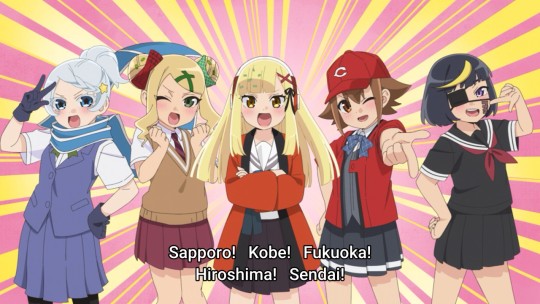
Yatogame has long run out of hot Nagoya facts and its ensemble comedy never amounted to much, so now it seems mostly content to just spam more and more wacky character designs. About the only thing that it has left going for it is that 3 minutes a week are more effort to drop than to watch, so I expect them to make a movie next. 4/10
Go-toubun no Hanayome S2
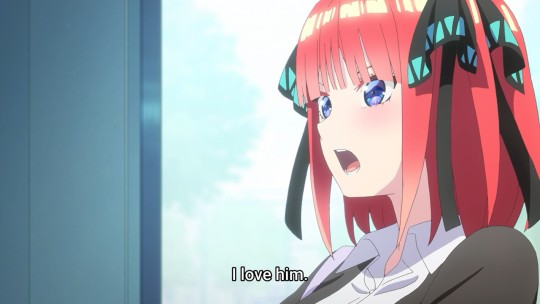
Quints is a weird one. S1 was a barely good enough (i.e., well above average) implementation of the ages old harem chestnut. S2 is actually better at the core of its appeal, since it gives all the characters a sharper profile (things like taking Nino from joke to badass and making Ichika a villain are no mean feat), but it does pay a steep price for it. You see, to deliver a steady drip feed of meaningful character moments it apparently has to rush through the source material at a breakneck pace, which completely wrecks the "story" part of this story and makes every episode seem like a recap. And it still keeps wasting precious time on vestigial nonsense like its framing device and the Kyoto flashback scenario that was already the worst part of S1. But by far the most annoying aspect is its insistence on keeping all the options valid, since it prevents any real progress and makes everything seem arbitrary and pointless. So sure enough, after a season of much ado we still don't end up anywhere — you can't really raise the stakes if all at stake was "who wins" to begin with. It's watchable and even enjoyable scene-for-scene but it's getting harder and harder to call it a solid show overall. 5/10
Skate Leading Stars
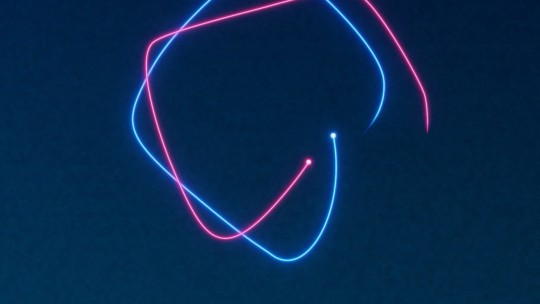
I was watching this primarily because I didn't like Yuri on Ice much and wanted to see if something that is a blatant attempt to cash in on it would be better — because while YoI delivers on one aspect (being hella gay), it really is an absolute shambles of a sports show. And sure enough, Skate Leading has none of the auteur appeal of YoI, but it just works much better. In particular I appreciate how it managed to make me care even a little about a cast of assholes, which is a nice contrast to the nauseatingly ingratiating way YoI tries to make you love its characters. Also, Skate Leading is just generally cheap and unambitious, so not susceptible to trying hard and painfully flaming out on the presentation side like YoI is. But at some point you gotta let go of these comparisons and on its own Skate Leading is... just fine, I guess? Competent, mildly engaging, not very memorable. And that's probably where it loses to Yuri on Ice in the end after all, even if I think it's "better". 6/10
Idoly Pride
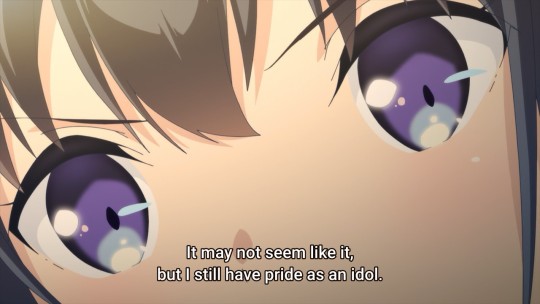
Idoly Pride sold itself on me with a really good (and hilarious/tragic) first episode that was just too bizarre to ignore — I mean, how can you ignore GHOST IDOL MANAGERS. Well, the majority of the show isn't like that. It's a competent and solid version of the idol franchise show, yes, but it really had more potential than that. Especially midseason, it gets lost in these dozens of characters, and while they're all likeable, it does seem like a waste of a good story just centered on Mana/Kotona/Sakura. By the end it comes back around to the heart of the matter with a Maeda-style sob story, which could be a disaster but seasoned veteran Jukki Hanada makes it work anyway. Overall, there's quite a bit of ridiculous hacky melodrama in this, but quite honestly that's the best part and I wish it would concentrate more on it. The rest is just okay. 6/10
Yuru Camp S2
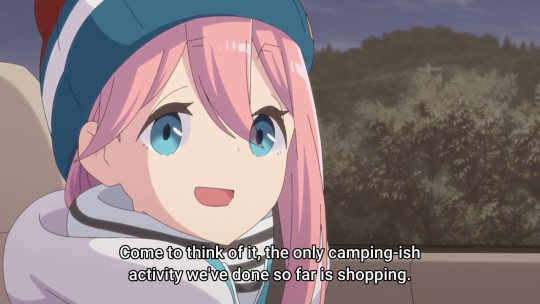
Yuru Camp is still likely the best pure iyashikei show when it gets down to business. Compared to S1 though, this seems to happen less and less. At its peaks (i.e., basically any quiet moment with Rin) it's at least as good as ever, and there's some good cast additions like Mini-Inuko, but it appears that Yuru Camp simply has run out of things you can do with camping and it fills up the time with other... stuff. This stuff includes the generic school club shenanigans it was never particularly good at, and a gigantic helping of crass consumerism. Yeah, I would say the majority of Yuru Camp is just a straight up infomercial at this point, which itself ranges from the perfectly acceptable (which cute anime isn't about food constantly), to the sketchy (I don't know whether the Izu tourism board cut this production a fat check, but if they didn't, Yuru Camp still gives its best effort to make it seem that way) to the highly irritating – I am aware that camping requires gear and you can't just ignore that, but you most definitely do not require whole arcs dedicated to talking about raising funds for the purposes of acquiring the Lamp of Comfy Happiness at your friendly local Caribou™ either. Not to mention an arc where the aforementioned lame school club does the same, for double irritation. Make no mistake, this show is so riddled with scenes that beg for a solution to embed affiliate links in video files that it makes me wish I was watching something as anticapitalist and underground as Love Live. And irritating really is the last thing a show with this core concept, as stellar as it is at that, can afford to be. Bummer. 6/10
SKOO the Infinity
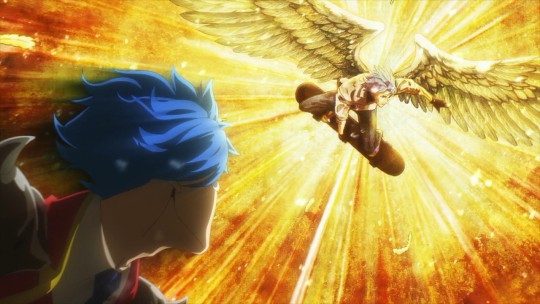
Skoo has one really huge asset: ADAM, its magnificent villain. It also has one really huge liability: Reki, its not magnificent protagonist. To be more specific, it's very good at anything outrageous, physics-defying and silly, such as most scenes ADAM is in, and quite bad at anything serious, dramatic (in a serious way) and down to earth, such as most scenes Reki is in. So, what's the verdict? Well, the rest of the cast is more ADAM-like, and Reki's co-protagonist Langa is fine as the straight (yeah, right) man. The tedious buddy drama is a comparatively small part of this show, and at least it pays off quite well in the end. Seriously, I was ready to give this a 6, but the final episode is probably the best one of the show, in all of its aspects. That's really not something you see often. Skoo's a great time. Except when it's not. 7/10
Non Non Biyori Nonstop
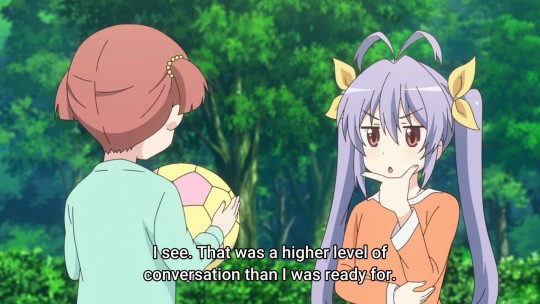
Speaking of the rare good ending, what about we gave one of those to a slim and inconsequential slice-of-life show? NNB has always been solid, comfy and amusing quality with a couple of standout moments (usually something with Renge), and Nonstop has that plus an ending as conclusive as any show of this type is ever going to have. Besides, it does a lot of things right by focusing on more characters than the central 4 (especially Konomi has great material in S3), it expands the universe just enough to not get stale, and it moves things forward — It's definitely a lot better than the movie, is what I'm saying. Apart from that, well, we're three seasons in, if you have any interest in this you probably don't need me to explain what's good about NNB at this point. Bonus points for being nothing but an ad for the manga. 7/10
Wonder Egg Priority
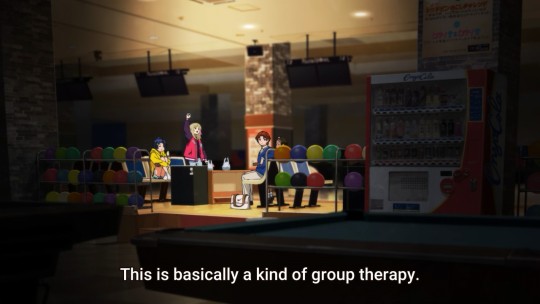
Oh boy, so here's the big one. Wonder Egg is the rare Meaningful Arthouse Show About Real Issues You Guys, as you might have heard. And well, the long and short of it is that it's a very good show with quite a few glaring problems (besides not actually being finished due to production issues, but what we have is enough of an ending to be able to meaningfully talk about it). In particular, one problem: WEP is, at its core, one of these metaphorical Magical Girl-ish series that are just a thin layer of abstraction over coming-of-age or societal problems. The issue is that "metaphorical" in this case means "literal" and "thin" means "basically nonexistent". This show is not subtle regarding what it's about, at all. This is a double-edged sword — on the positive side, some things really should just be said aloud, and I'm really, really fucking tired of the Ikuhara style of "here's some wacky things, maybe a blog post will eventually tell you how it's actually about the most important thing ever" obfuscation — if it's really so important, just spell it out. On the other hand, there are limits to this and when a second, different Ai appears I don't really need a voiceover line telling me that yep, this show is about parallel universes now. WEP spells out many important things, but it also spells out many things that are implicitly clear or better left vague. Not to mention that with being so obvious up front, the show's tendency to leave figuring out what it's actually saying about it up to the viewer can leave the wrong impression. Again, I settled on the opinion that it's subtle after all where it counts the most, but you might easily get the impression that it pulls its punches (Ikuhara does this the exact other way around — once you figure out what the fuck he's talking about it's abundantly clear what he's saying about it).
In fact, this show is so good at subtle, quiet character moments that it calls into question the need for big huge fighting fantasy layer in the first place, especially since I'm not a fan of the fantasy designs and the fights aren't great. Sure, they look impressive on a technical level (this show is very good looking in general), but the lack of actual impact or rhythm makes me think this is not made by people who are very familiar with action and maybe they should have asked some seasoned shounen veterans for this — or just, you know, not do it. They can (and do) impress with character acting in quiet scenes just the same. And while Ai's character story actually does pay off quite nicely by the end we got, and Momoe and Rika are also handled well, Neiru's backstory is significantly less good, not to mention the whole Frill subplot regarding the show's mythology that they introduced just before (and that's the part to be resolved at a later date), which is a huge can of worms. We'll see how well they handle that, I suppose, but as it is it's a weird and vestigial detour that doesn't add much besides thematic headaches.
But yeah, apart from all that — I like it, a lot. Great character writing in the details, cool looks for the most part, tons of ambition, and a message that I consider to be appropriately handled — for the most part, and for now. Not quite ambitious arthouse anime at its finest, but also not a pretentious disaster like Sarazanmai, Monogatari et al. 8/10
#anime#review#winter2021#Yatogame-chan Kansatsu Nikki#Go-toubun no Hanayome#Skate Leading Stars#Idoly Pride#Yuru Camp#sk8 the infinity#Non Non Biyori#wonder egg priority
34 notes
·
View notes
Note
Uhhh but like.. wands and broomsticks that fly is very normal magic? Idk I might be missing something here but that's like the stuff from stories in (I'd say like maybe the majority?) of Europe, together with potions? It fits very well into European's magic myths? Aksjdj but I may have misunderstood you here idk. But yeah, I always found it weird that the UK had it's own school while the rest of Europe shared two schools?? But then again, I'm pretty sure it was said the students are French and uh Bulgarian? I think? So what's up with the rest of the continent? Hell, what's with Asia? Imagine if they had only one school! That would be hell! Tbh it would make a lot more sense if like... every country has their own school? Like a) not every eleven year old kid is able to speak perfect English (aka the language they most likely would converse in, but this goes for any second language probably) and is probably unable to follow the lessons because of that. b) it's just.... too many students for two schools? like we're talking about how many countries? 40-something if you exclude the UK? with lots of different cultures and lots of students probably? I think Germany, or Spain, alone would need their own school, with some Austrian or Swiss students because these are smaller countries and they share a language. (Well, half-half in Switzerland and both countries have their specific dialects etc. but they would still be able to communicate without much struggle). You would probably need multiple schools in the US, too!
There are probably some families that teach their kids magic on their own, but as far as I remember that stuff was never actually established so this is just a wild guess. But most of Europe to do this? Unlikely.
I was more thinking about the one or two word Latin incantations than the wands and broomsticks and potions, although wands and broomsticks are part of a specific image of magic and as far as I’m aware have very little in common with actual historical practices. But definitely the Latin is a bigger issue; if nothing else, why are modern spells written in Latin and not... I don’t know, the actual language the inventor speaks? Also apparently some of the spells are actually based in ancient Greek, so clearly it’s not tied to one language; why would it be majority Latin? What about people who can’t pronounce Latin words? Not everyone can pronounce certain sounds! Also if they’re using classical Latin they pronounce spells wrong in the movie, can’t speak to ecclesiastical but if magic is as old as it’s supposed to be I’d say it would probably be classical anyway ...Also I’m now wondering why the fuck there isn’t a Latin class at Hogwarts, you’d think that would be useful.
The thing with the number of schools is... talking about North America, Toronto alone has over a hundred high schools? One city has more high schools than the wizarding world has schools in total across all of Europe. I know Canada’s big, but it’s not that big. If wizards are that rare then intermarrying with muggles or no they should be so extinct by now! Even with one school per country and keeping in mind that most European countries have much smaller populations than Canada, that would still be an insanely small population. Also there’s travel time to keep in mind; yes, some students will live farther from the school than others and that’s inevitable, but... well. Let’s start with Hogwarts, because it’s the smallest area: Belfast to London? Assuming Ireland doesn’t have its own route to Hogwarts? Nine and a half hours by car. By train, twelve hours. That is a long time for a bunch of kids to travel to get to another train, a lot of it in the wrong direction! Hell, according to the internet London to Fort William (in the Scottish Highlands, although I don’t know how close it would be to Hogwarts’s location) is thirteen hours! And that’s the smallest area we know of that a magical school covers! Let’s talk Ilvermorney, in Massachusets; I hope they use floo powder or something, because to get there from Alaska that is a 73 hour drive. Even flying it’s still eight and a half hours at a minimum! And I feel really bad for the Hawaiian students, because a flight to Massachusetts from there is over eleven hours! These travel times are insane and I strongly suspect JKR didn’t bother looking at a map before placing these schools. Also if the various schools do use floo powder or portkeys or something (which I can only assume they do because holy shit) why the fuck doesn’t Hogwarts? Again, unless the Hogwarts Express is insanely fast that’s still half a day, plus however long it takes people to get to London! Why doesn’t the train at least set off from a more central location or have multiple stops this is so stupid-
Basically yeah, the placement and numbers of the schools makes no sense and I hate it, also I have just spent far too much time looking up travel times.
26 notes
·
View notes
Text
The Critique of Manners: Part III
~Or~
A Somewhat Indecisive Review of “Emma” (Miramax, 1996)
I have a feeling this review is gonna be a little harder for me to write. Everyone knows that recaps and reviews are most entertaining when the writer has an intense dislike (or intense feeling of any kind) for the drama they’re reviewing. It falls to other writers to pan or praise this film as they will, but I simply don’t have many particularly strong feelings about it at all. I have neither that repulsed dislike for this movie such as I did for Emma 1997, nor that disappointed frustration as for certain aspects of Emma. 2020, but neither do I have a deep, profound love and appreciation for it as I do for Emma 2009.
Written and Directed by American Screenwriter, director and actor, Douglas McGrath, Emma (1996) is rather what one expects it to be: a 90’s romance film. Perhaps it’s because I had expectations due to the era in which it was made, but I think I have a tendency to excuse some of the problems with this film. There are many unnecessary additions (for comedy’s sake usually and often quite cringe-y) and one definitely can’t claim that the dialogue hasn’t been tampered with. I don’t normally side with the “I do so miss Austen’s biting wit” crowd but, by ‘eck I felt it this time. That’s because Austen’s Biting Wit™ just doesn’t suit a fluffy 90’s chick flick (which this film is in a way that other big screen Austen adaptations of the time just aren’t – and I think approaching this film from the 90’s chick flick perspective is probably the best way to digest it.) This version, more than any other (except perhaps 2009) brings the concept of Emma-as-Matchmaker to the fore with a particular emphasis precisely because it’s a concept that fits well with the rom-com style of filmmaking used here.
The bones of this review, like my review for the ITV version, were written six years ago following my initial viewing only a select number of portions survive from that review (which is still on IMDb).
As with all my reviews I'll be comparing the script, characterizations and plot to the book and commenting on the authenticity and attractiveness of the costumes, and suitability of the houses and sets.
Let’s dive in.
Cast & Characterization
Emma is arguably the easiest of Austen’s works to read because of Emma’s generally good (if condescending and overly self-confident) character, and Mr. Knightley’s sober, mature but exceedingly pleasant manner. I had my doubts about Gwyneth Paltrow playing an Austen heroine, but I at least had faith in Jeremy Northam’s ability to portray the mature Mr. Knightly. My expectations were not entirely disappointed in either case.
My prevailing feeling about this film is that it’s not so much set in Jane Austen’s Regency England, but in an American fantasy of what Regency England was like. Perhaps the biggest factor that reinforces this impression is (of course) the casting choice for our leading lady, Gwyneth Paltrow.
Freckled, ruddy and thin as a twig, Gwyenth didn’t quite, to my mind, fit the physical description of Emma, who is supposed to be “The picture of health” according to Mrs. Weston. Add to this the Regency beauty ideal of a soft and shapely figure with regular features. Fair hair was generally preferred (and I have always imagined Emma as blond, although I’m given to understand that Austen’s idea of pretty generally favored dark hair), so I can’t fault Gwynnie there. What I can fault though is her so-so British accent.
I recently learned that the reason McGrath thought Paltrow would be a good choice was because she’s the only Texan he’d ever met who’d managed to entirely throw off her native accent; I guess he decided that if she could do that she could do any accent work? I guess? Seems questionable to me.
You know Joely Richardson was considered for this part? Gorgeous, refined (British) GODDESS Joely Richardson was passed over because Gwyenth managed to shake an embarrassing accent.
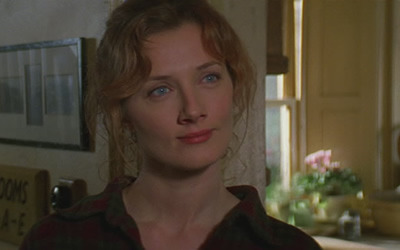
I hate American directors.
I’m not sure if it’s just part of the accent, or her attempt to sound upper class, but on this most recent re-watch it hit me for the first time how very nasal many of her line deliveries are. She also has this problem with looking (and sounding) sort of vapid and… just what is happening here?
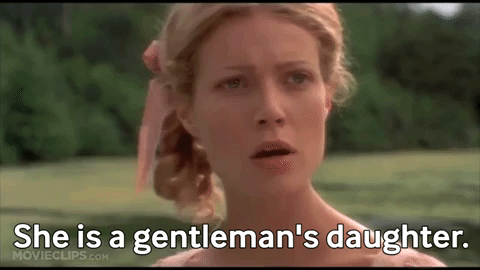
Is she having a stroke at the end there?
A bigger problem than Emma’s casting, however, is her characterization.
Part of the above mentioned script tampering is in lockstep with some of the issues with Emma’s characterization here. Her very teenager-esque swings from vowing to never make another match again to immediately trying to think of another guy to set Harriet up with, and her getting carried away in potential scenarios “But if he seems sad I shall know that John has advised him not to marry Harriet! I love John! Or he may seem sad because he fears telling me he will marry my friend. How could John let him do that? I hate John!” (Especially when you never even really get to meet John Knightley in this version? Ugh, pass me with this shit) is so bizarrely childish it’s a little hard to stomach. She spends the movie going back and forth between mature and manipulative to childish and naïve and it just… doesn’t work for me. Emma can be all of these things but the transition from one extreme to another here seems a bit disjointed to me.
Knightley was a bit of a disappointment to me in this version. That’s not Jeremy Northam’s fault because I can’t think of a better choice they could have made. McGrath showed much better judgment with his choice for Mr. Knightley than he did with Emma.
My biggest problem with this interpretation was how laid back he was when he was supposed to chastising Emma. Their quarrels became more like mere disagreements so the proposal line of lecturing her and her bearing it as no other woman would have isn’t entirely earned. Even in the big scene at Box Hill where Knightley is really supposed to lay into Emma, he starts off pretty solidly, but by the end so doe-eyed and apologetic it fails to deliver the sting of rebuke that is Emma’s biggest learning moment in the story. Perhaps they were trying to go for a more disappointed feel (the kind that makes you feel worse than being shouted at because you really respect the person you let down) but it just didn’t come through for me.
Also of note is the fact that, (I assume) because John Knightley isn’t really allowed time to be a character in this film, McGrath took some of John’s introverted tendencies and transplanted them into his more convivial older brother (“I just want to stay home, where it’s cozy.” – I mean I feel that, but this isn’t something George Knightley would say.)
Onto the less central characters
I question also the choice of Toni Colette for Harriet Smith. I mean I actually liked her performance more on this watch than previously but I just don’t think she’s pretty enough for Harriet, and she looks a bit clumsy (though that might have more to do with her costumes.)
I also noted that McGrath bumps Harriet’s comprehension skills up just a scooch. Emma never has to explain the “Courtship” riddle to her, Harriet figures it out on her own after a while, while she never manages to in the book.
Now we come to the crux of Jane Fairfax, played by Polly Walker. I don’t care for this choice. My issue is the simple fact that she just isn’t believable to me as a demure, wronged character like Jane Fairfax. Seriously she looks like she would sooner throw Frank across the room than take his cruel teasing, and not in the subtle way that Olivia Williams managed to. They never even utilized her by including some of Jane’s more pointed returns to Frank’s jabs, which they even managed to squeeze into the massively cut down TV movie.
Speaking of Frank; Ewan McGregor, though generally delightful, was so under-used. Frank and Jane’s plotline always kind of gets shafted in Theatrical release adaptations of this story. It’s not as bad here as it is in say, the 2020 adaptation (they were in that version so little I actually forgot what their actors looked like), but it’s still pretty stunted.
I find it interesting that Ewan McGregor himself thinks his performance in this movie isn’t good; and I’ll agree it’s not his best (certainly it’s no Obi-wan Kenobi) but I thought he did a pretty good job with obviously unfamiliar material
Also if the Davies screenplay of ’97 made Frank’s character too caddish, I think this version didn’t make him caddish enough. I mean he’s hardly around enough to really develop his flirtation with Emma, and they merged Strawberry Picking and Box Hill into one sequence so we never see Frank’s ill humors. I can perhaps excuse this, since it seems like a nuanced story really wasn’t what McGrath was going for here, I think. This is a lite version of the story; schmaltzy fluff for teenage girls’ movie nights. Frank’s ill humors wouldn’t really have fit the tone of this version at all.
Interestingly enough, though it’s taken me a long time to make this decision, I think Alan Cumming might be the definitive Elton? He’s the only one who doesn’t immediately read as a slime ball from the get go. I mean he’s got all the warning signs that Austen wrote into him, but no more than that. He’s not slinking about greasily or obviously pandering (at first), so Emma’s uneasy realization of what’s really happening here isn’t a hundred miles behind the viewer’s (maybe just fifty).

There are as many Mrs. Eltons out there as there are adaptations of this story, and they’re all pretty great (funky accents aside), but other than the 1997 take, this one might be the least great to me. She’s not nearly pushy enough, because Mrs. Elton would never let Emma prompt the conversation when she could do it herself.
Also, I think McGrath misunderstands Mrs. Elton’s brand of New Money vulgarity. He has her talking with her mouthful, clanking her utensils on her plate as she eats, putting biscuits which she’s bitten into back onto communal plates, which I think even Mrs. Elton would know not to do. Table manners are pretty basic; the couth that Mrs. Elton lacks is of a more nuanced social kind – for instance, what is and isn’t considered gauche to talk about (like how big one’s brother in law’s house is or how many horses he keeps.)
(A sudden thought has just occurred to me: is Mrs. Elton just a more mean-spirited Hyacinth Bucket from Keeping Up Appearances? “It’s meh sister, Mrs. Suckling! That’s right, the one with an estate in Warwickshire and the two barouche landaus!”)
Sophie Thompson’s Miss Bates is chatty and one of better takes on the character, but lack of necessary background hinders her impact on Emma’s story. The comedy in her scenes is some of the best and actually made me laugh, although I think she was just way too giggly.
Miss Bates’s mother, Mrs. Bates, is played by Sophie Thompson’s real-life mother Phyllida Law in a completely coincidental quirk of casting. (I noted in this film how very much Emma Thompson, Sophie’s older sister looks like their mother.)
My only other serious issue with characterization in this adaptation is the representation of Mr. Woodhouse. He is somehow simultaneously more cheery and more disagreeable than he is in the book. His chiding about the cake at the Weston’s wedding seems more like a scolding rather than an anxious admonishment. In one of the first scenes, during Mr. Woodhouse’s “Poor Miss Taylor” speech, he says he cannot understand why she would want to give up her comfortable life with himself and Emma, to have “mewling children who bring the threat of disease every time they enter or leave the house,” and he says this IN FRONT OF ONE OF HIS TWO DAUGHTERS.
Of course in the book, Mr. Woodhouse does lament Miss Taylor marrying, leaving and even having children – but this is all in the context of the danger childbirth presents to Miss Taylor (And the fact that he can’t stand losing a companion). These are his complaints – not the children themselves. In addition, his elder daughter has quite a fine number of children, all of them very young, of whom Mr. Woodhouse is very fond. He’s a character that needs to be carefully handled because, much like his daughter, it’s very easy for him to become unlikeable.
For the rest of the time, though, he just sort of cheerily laughs and is very at ease, when Mr. Woodhouse, as a chronic hypochondriac should be made anxious by just about everything.
Sets & Surroundings
One thing I find interesting about this adaptation is that the houses they chose to use are all of a very neo-classical Palladian style, which I believe (given her disdain for the contemporary trend of knocking down England’s great houses just to rebuild them in a more fashionable style) Austen may have disliked to some degree.
One such house is Came House in Dorset, which was used as the Woodhouse’s estate, Hartfield. Now Hartfield is, I think, described as a well-built modern house so this could be pretty accurate (although Modern could refer to the red bring, boxy style of Georgian architecture, such as the houses used in the 1997, 2009 and 1972 versions.)
Another, Claydon House in Buckinghamshire played the role of Donwell Abbey. I think this might be the worst exterior ever used for Donwell, from a book accuracy perspective. Utterly Georgian, with its’ square façade, Claydon house sort of directly contradicts Austen description of being “Larger than Hartfield, and totally unlike it, covering a good deal of ground, rambling and irregular…” not only is the architecture totally wrong, so is its’ situation, in Georgian fashion, perched on a hill, when Donwell (a very old building) is supposed to be “Low and sheltered”.
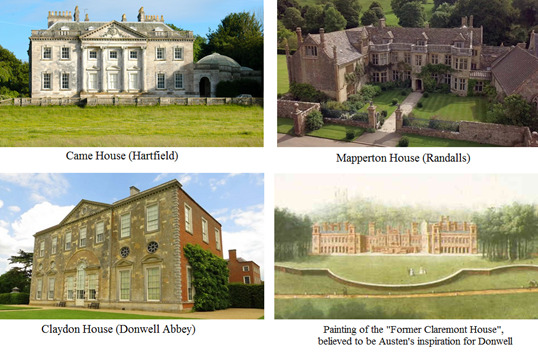
Mapperton House is maybe the grandest house yet used for Mr. Weston’s Randalls (I’ve already covered in my review of Emma (2020) why this is a problem – although in this version, as in the 1997 adaptation, there’s no full panic over the snow, so this is less of a problem, but a house like this is still too grand for the reasonably sized Randalls of the book), but it fits the usual 15th-16th century house type that always seems to be used for Randalls.
A myriad of other great houses were used for interiors, however other than Crichel House (Dorset), which was used for Donwell’s interiors, I can’t find information on which ones where used for what. They include Breakspear House (Harefield), Coker Court (Somerset), Stafford House (Staffordshire) and Syon House & Park (Middlesex).
I really appreciate the interiors which were all very colorful and even included doors and molding painted the same color as the walls which is a very Georgian decorating convention, although it looks odd to the modern viewer.
Costumes & Hair
As a rule, the costumes (Created by Ruth Myers) in this movie are pretty damn good, composition wise, but the arrangement leaves a lot to be desired. Myers talked extensively of wanting the costumes to be colorful and bright like the water colors of the time, which she achieved brilliantly. What I find funny is that she talked about using color as if it would be controversial from a historical accuracy point of view, which couldn’t be further from the truth.
The evening wear is generally excellent
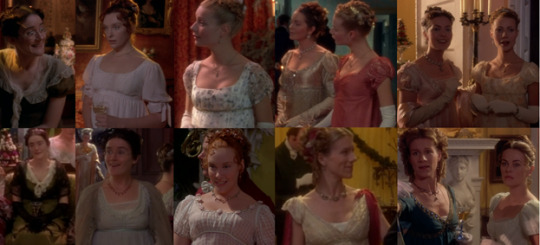
My only question around evening wear here is… what’s up with the waistline on Harriet’s ball gown? Why is it going up in the middle? Toni Collette (who actually gained weight for the role, since Harriet was described as “Reubenesque”) verged on looking a little dumpy throughout the film and awkwardly bumping up her waistline in the middle really didn’t help.
I’m pleased to report that is is the one version where Miss Bates’s evening-wear is allowed to look like evening wear. Even Maiden Aunts wore shorter sleeves and lower necklines at dinner or balls. They fussed her up with some lace gloves and frilly fichus but it follows the conventions of the time. I appreciate that immensely, though I have the sneaking suspicion that it’s because of Sophie Thompson’s age.
At 37 Thompson was an unconventionally young choice for Miss Bates, a character who previously had only been cast as older than 50 (Prunella Scales, who would play the role later in 1996, was 64). Indeed, Douglas McGrath almost passed Thompson over for the role on account of her age, but reconsidered after seeing her in spectacles. It seems possible to me that since Thompson was considered young they dressed her “young” as well.
The daywear is where the costumes start to really fall apart. There are a lot of looks here worn in the day that are VERY not day/outerwear appropriate, especially on Emma, most especially the yellow dress she’s wearing while driving that carriage (which, btw is inappropriate on a whole OTHER level). Can we just talk aboutt he cognative dissonance of bothering to put a bonnet on her when her arms and boobs are just hanging out like that? Like, it would almost have been less egregious to just leave the bonnet where it was.

But then there are a lot of Emma’s day-wear looks that are perfectly suitable and appropriate. What I find ironic about that is that most of the short-sleeved, low-necked “Evening-gowns as day-wear” looks are worn OUTSIDE in the sun and most of the long-sleeved, sun protecting, day-wear appropriate looks are worn INSIDE. She’s also got a profusion of dangling curls in day-time settings that are also more evening-wear appropriate (to match the dresses, perhaps?)
I’m also pleased to report that even in day-wear Miss Bates gets a break from brown in this version. Her clothes are nice, but not fancy like Miranda Hart’s in Emma. 2020, and I like to think that nice thick shawl with lace overlay is the one mentioned in the book that Jane’s friend Mrs. Dixon sent along home with her for her aunt.
My only problem with Mrs. Elton’s kit is that it’s all perfectly nice, but none of it is overly-nice. There’s no extra trim, no unnecessary lace, not even any bold colors. I hope Myers and McGrath didn’t take Mrs. Elton’s line in the book about her fear of being over-trimmed seriously.
Let’s talk outerwear. There’s a lot of going into town with JUST a shawl on in this movie (usually over short sleeves), and I’m sorry but I don’t think that’s how outer-wear worked in this time period. A shawl is good enough when you’re taking a turn in the garden but not for going out in public into town, unless maybe you’re wearing long sleeves, or perhaps paired with a SPENCER.
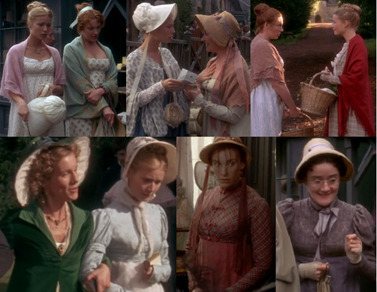
Never mind Mrs. Elton’s line about a shocking lack of satin at the end of the movie, I’m more concerned about the shocking lack of spencers. There are precisely three in this film. I counted (and the sleeves on Emma’s look like maybe they’re too long for her?) Mrs. Elton sports the only redingote in the film.
Jane Fairfax is, as always, in her classic Jane Fairfax Blue™,
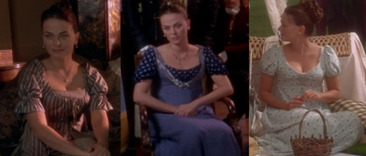
although she has some nice white gowns at some points too.
Now, onto
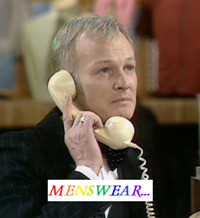
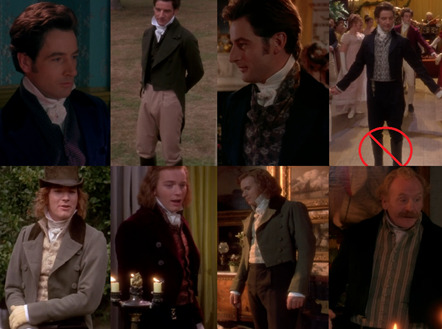
Definitely a bit more colorful than the 97 adaptation. Mr. Knightley benefits most from the addition of colors other than green. He’s even got some smashing waistcoats and a very nice blue evening coat (I couldn’t get very good shots of them though). The problem is; those trousers? NOT. TIGHT. ENOUGH.
Also… you all see it, right? I circled it in red so you should. Yeah. Knightley is dancing in boots. WTF RUTH? Please! You’re better than this! Who dances in Prussians like that? I ask you! (Frank also wears boots to the Cole’s dinner party so that’s two strikes.)
I’m not sold on Frank’s looks. His day-wear is a bit sedate for such a confirmed dandy (I believe he’s called a “coxcombe” in the book?) and his evening wear… well he apparently only has the one look.
And speaking of Frank’s look in this film, I’d like to know at whose doorstep I should lay the blame for what Ewan McGregor himself has called “The Worst Wig Ever”; and why the hair designer in charge decided to model Frank’s aesthetic on a theme of “Chucky meets the Mad Hatter”.
This hairstyle not only looks dreadful, it’s not at all fashionable or authentic to this time period! Fashionable mens’ hair styles at this point were all relatively short. A Beau Brummel coiffeur, or a short Roman style, or a fashionable head of curls like Mr. Elton’s! Not this farmer chic. Robert Martin’s hair is more fashionable than Frank’s!
The tune they chose for Emma and Knightley’s dance is a baroque melody (so a hundred or so years out of fashion) called “Mr. Beveridge’s Maggot” and as is pointed out in the video linked above, and is the same tune and dance used for Lizzie and Darcy’s big dance in Pride and Prejudice (1995).
I get why it was used in P&P because, slow, stately baroque tunes are often used as on-screen short hand for snobbish character like Mr. Darcy. It’s not super intense either, like the baroque tune used in P&P 05, which was chosen for more romantic effect. So why use this kind of “stuck up” tune for what should be a romantic dance? Maybe because it was used in the 95 P&P which became, almost instantly, one of the most popular Austen adaptations?
Quick note on the dancing and music in this movie. I’m not an expert on English Country dance (I’ll outsource that by giving you the usual link to Tea with Cassiane’s analysis on YouTube) but I’ll add my two cents - I know Cassiane gave this a pretty favorable three full dance slippers but I think the way all of the actors and dancers move looks very poorly rehearsed and kind of sloppy. I think everyone just spread out way too much.
Douglas McGrath’s Script
I have to say one of the things this film did very well and brought to the forefront is how insular Emma’s life is. The opening credit sequence brings this to our attention right away by showing a spinning globe which, once it slows down is shown to be, literally, Emma’s whole tiny world. Hartfield, Donwell, Randalls and Highbury. That’s it. It’s perhaps not a very subtle device, but it does get the job done and very succinctly too.
I would now like to talk about my issues with the script of this movie; I have some problems with it. Very different problems than it’s 1996 counterpart though.
First let’s go over the comedic device that jumped out to me most in this movie: the awkward pause.
I think it’s only used twice but they both bothered me.
First there’s the pauses while Emma and Mrs. Weston grill Knightley on whether he considers Jane Fairfax romantically. It’s all written as very “OoOoOooo” with Knightley answering their interrogations and then sitting between them awkwardly as they stare him down as, none of his answers giving either Emma or Mrs. Weston satisfaction. This is one of the most teen rom-com moments of the film to me.
Next there’s all the quiet stretches while Emma and Mrs. Elton have tea at Hartfield. I don’t like the use of awkward pauses in this case because (as I mentioned in Mrs. Elton’s characterization section) it’s so ludicrous to me that there are pauses in this conversation at all. Surely the point of Mrs. Elton is that she loves to hear herself talk and her conceited obsession with the idea that everyone around her must only benefit from hearing her opinions. There should be no conceivable reason why Emma should have to prompt conversation like she does in McGrath’s version of this scene, except to derail Mrs. Elton’s constant self-important yammering.
Watching it this time around I found myself wondering exactly what McGrath wanted to do with this film. I mean I’ve been attempting to decipher exactly whether the changes made were conscious and based on artistic vision, or whether they were changed because the source material just flew over McGrath’s Hollywood Director head.
I mean he gets the important plot points across, but there were other scenes that I had issues with: namely, the Archery scene. This is a pretty intense part of the book because Mr. Knightly goes from astonished, to indignant, to truly vexed with Emma in a short period of time. But this scene in the movie is very casual. The part where Emma’s arrow goes wide and into the general direction of Knightley’s dogs, and he takes an opportunity to make a quip and says “try not to kill my dogs” particularly annoyed me. My issue is that this totally ruins the tension of the scene; and why are Knightley’s dogs sitting BEHIND THE TARGETS ANYWAY? Knightley is a sensible man, and one who knows better than to let his dogs rest in a place where stray arrows could hit them!
The dialouge is very jarring because it flips back and forth beetween being alright, and period appropriate and then it will just spring a very modern turn of phrase and pull you completely out of the setting. I know this is something that’s been brought up with the 2009 version as well but maybe it’s because the actors in that version have (in my opinion) better chemistry that it simply doesn't stick out to me as much.
The comedy in general in this movie just makes me cringe a lot of the time (Sophie Thompson’s “oh sorry, napkin” bit notwithstanding). Like the soup thing when Emma and Harriet meet Mr. Elton after visiting the poor, and the random kid that gets tossed into this scene with Emma… just doesn’t work for me.
Wikipedia describes McGrath’s tweaks on Emma and Knightley’s banter (which really weren’t changed that much, textually) as “Enlivened” to make the basis of their attraction more apparent, which… I’m sorry but nothing about the exisiting banter isn’t lively if delivered in a lively manner. And I wouldn’t exactly call Gywneth’s performance lively, because she has to concentrate to keep that accent up.
I mentioned already that what McGrath essentially did with Emma was take Austen’s story, and remove the nuance (Such as lightening Frank’s infractions in his relationship with Jane and, while not totally contradicting, but also not highlighting the economic commentary of the story that is thematic in Austen’s novel) in order to make a straight up 90’s comedic romance film (Which, if you doubt this, look no further than Rachel Portman’s Oscar Winning but very dated score).
My Question is why? Why bother when the SAME STORY had been adapted into a HIGHLY SUCCESSFUL, modernized rom-com THE PREVIOUS YEAR, which actually, even while being set in the 90’s, did the story greater justice, with far more insight and quality?
Emma (1996) was always going to be over-shadowed by Clueless. At the end of the day this whole movie was kind of a futile effort because despite excellent production quality, the actual contents are watered down and, in my own opinion, pretty roundly mediocre.
Final Thoughts
When I first watched both of these versions I came at it from a very one-or-the-other perspective. I forgave McGrath’s film because it was light and colorful and I’d heard Davies’ version praised so highly at that time as the only faithful, definitive version (only to be let down by it in almost every possible way). But coming right down to it now, it’s hard for me to really excuse McGrath’s effort because a version of Emma that doesn’t take itself seriously enough is almost as bad as a version that takes itself too seriously.
It never fails to jump out at me how diametrically opposed these interpretations are, from the characterization right down to the tone and lighting.
McGrath’s Emma is light in every sense of the word, where Davies’ is dark and ponderous. McGrath’s Knightley is laid back where Davies’ is aggressive and ferocious. Frank, in McGrath’s version, is let off easy by the narrative playing down his moodiness, while in Davies there’s an overshadowing dark-cloud of off-putting caddishness.
Ribbon Rating: Tolerable (58 Ribbons)
The more I watch the 1996 adaptations of Emma (invariably back-to-back) the more firmly I am convinced that Andrew Davies’ made for TV film was (in some ways) a direct response to McGrath’s motion picture.
Tone: 7
Casting: 7
Acting: 5
Scripting: 5
Pacing: 4
Cinematography: 4
Setting: 5
Costumes: 6
Music: 5
Book Accuracy: 6
18 notes
·
View notes
Note
The issue with Rent is that people treat it like a completed musical when it wasn't. Larson died the day before previews started and it's well known how much shows change in previews. Stupid things like the amount of telephone calls used to move the narrative along would've been cut and it would've been a more rounded show. 1/2
This is also why Rent the movie is better than Rent the musical, because the movie understood the plot holes and inconsistencies and fixed most of them to make it a more viewable musical 2/2
Of course this doesn't change the fact that intrinsically Rent is meant for a certain audience, and if you're not part of that audience you won't get it as much. But it did have potential to be better than the shitshow we got
i think i have to disagree with you, anon. while you bring up a great point -- that larson died before previews and thus the musical can hardly be considered ‘completed’ like other off/broadway shows are -- i don’t think that the movie is much better than the stage show, and i don’t think that, had larson lived to change the show past previews, it would’ve been that much better. certainly some things may have been, but there’s no guarantee that the changes made will actually improve things (there are definitely other cases of this), and i also think that Rent’s entire premise is perhaps flawed a bit too far past redemption.
from the standpoint of the film, i don’t think it’s really better than the stage show. cutting music in adaptation is fine as a concept but it should be motivated, and i think they cut too much out for the film that made the show a lot drabber of a watch. i also think they cut a lot of the music because the filmmakers just...didn’t know how to film musical numbers, which...why make a movie musical in the first place? sure, it comes down to personal preference whether you like things like the frequent telephone call numbers or not; personally, i like ‘em, but turning them into just talking scenes doesn’t make them stand out as either interesting or important in the film.
i do think, for the most part, the music numbers are where Rent shines. i like what Larson wrote, and i think they’re effective (for the most part. Your Eyes still sucks and it’s hilarious). like i said, i personally like the voicemails; i’m not saying you have to, but they serve a narrative purpose. furthering your plot through song is a great way to make even small moments feel bigger, more important, and more memorable; not to mention this is the hallmark of the book musical as a format. if you’re not going to further your plot through song, just write a play.
what makes Rent suck, in my opinion, has a lot more to do with the plot and characters itself. it’s an adaptation of La Boheme, so i guess you could try to argue that my grievances stem from the opera, but...adaptation sickness. some things get lost in translation. first of all, the characters in Rent are unlikeable assholes; characters in shows are certainly allowed to be assholes, but at least one or a few of them should be likeable. what do they actually stand for, besides a vague and shapeless ‘revolution?’ the text doesn’t give an answer. they’re just whining about...bohemian ideals, i guess? (this is probably why the show is so popular with so many people. it romanticizes the notion of protest but doesn’t give a cause to fight for, which makes it really easy to allign oneself with. early performative activism!) and the substanceless activism of the main characters is especially heinous when it’s directly in juxtaposition with other really important causes that they could be campaigning for -- namely, the AIDS crisis and homelessness. both of which are presented as being pretty central to the main characters’ conflicts and to the ensemble of new yorkers (which was largely cut from the film, for better or for worse.). should the homelessness crisis have been cut in previews? maybe. maybe Rent was spread too thin trying to address both huge issues at once, and struggled to address either adequately as a result. but we’ll never know, because the show is unfinished, and never saw authorial edits in previews. i don’t really think that this would have saved the show, though.
at its core, Rent is an adaptation of La Boheme; that was Larson’s foundational concept. in doing so, he substituted AIDS for tuberculosis. i think this could work, in theory, but there is a major difference between TB in the 19th century and AIDS in the 20th. if you got TB in the victorian age, no one could really help you. we didn’t have the robust systems of medicine and pharmaceuticals like we do now. in the 1980s, not only did we have treatments for AIDS, we also had a government that actively refused to provide said treatment to the infected and the vulnerable. that’s why the AIDS crisis was a crisis, and that’s why millions of people died. the AIDS crisis was not just a health crisis but a political one, too, which is the biggest difference between it and TB from a narrative function standpoint. Rent translates TB to AIDS directly without compensating for the very important and very different contexts between them. Rent turned AIDS into a tragedy without a perpetrator, which is false and unfair. Rent is a show about activism and revolution yet refuses to acknowledge and protest against the power structures that are the active causes and opponents of the issues that the main characters actually face.
for more information, on both why the narrative of Rent and the filmmaking of the movie adaptation struggle, i’d recommend checking out youtuber Lindsay Ellis’ video essay on the subject.
Rent reaches a wide variety of audiences and attracts a wide variety of fans (whether they are the show’s ‘target demographic’ or not), for a number of reasons -- some i think are good (like the music), some i think aren’t (see above). if you like Rent, great! i’m not saying you can’t or shouldn’t. at one point, i certainly did, too. but i don’t now, and i hope i’ve done a decent job at explaining why here.
16 notes
·
View notes